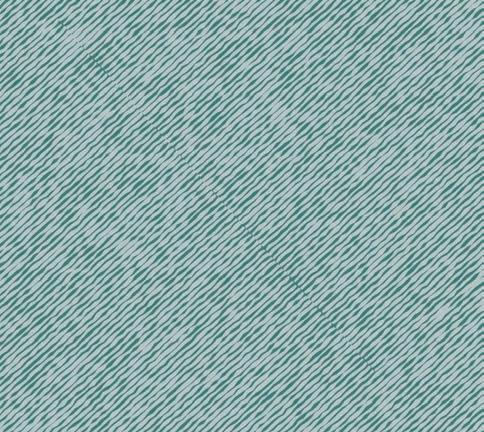

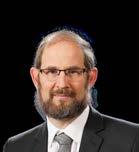

ISSUE 1502 JAN 28TH '23 ג"פשת טבש 'ו PARSHAT BO ה"ב OU ISRAEL 02-560-9100 | TorahTidbits.com | ADVERTISING 02- 560-9125 אב תשרפ YERUSHALAYIM IN/OUT TIMES FOR SHABBAT PARSHAT BO CANDLES 4:33PM • HAVDALA 5:48PM • RABBEINU TAM 6:27PM Simchat Shmuel Rabbi Sam Shor Program Director, OU Israel Center page 40 םיאצי םתא םויה ביבאה שדחב ד:גי תומש Dessert After Birkat Hamazon Rabbi Daniel Mann Eretz Hemda page 52 THIS WEEK'S ISSUE IS DEDICATED FOR A המלש האופר FOR הנבל ןב ריאמ בקעי

2 TORAH TIDBITS 1502 / BO 5783 Table of Contents This week's Torah Tidbits cover image!
We
ימשג
us. KIDDUSH LEVANA - SHEVAT Earliest Kiddush Levana, 3 Days After Molad 4 Shevat/ Wed. night Jan. 25 7 Days After Molad 7 Shevat/ Sat. night Jan. 28 Last Opportunity to Say Kiddush Levana until 15 Shevat/ Sun. night Feb .5, until 18:12 pm 04Dear Torah Tidbits Family Rabbi Avi Berman 08Living and Learning Rabbi Moshe Hauer 10Aliya By Aliya Sedra Summary Rabbi Reuven Tradburks 18The Spiritual Child Rabbi Lord Jonathan Sacks zt"l 24Blessing the New Month Rabbi Shalom Rosner 26Bed’s Barometer Rebbetzin Shira Smiles 28To Truly See Another Rabbi Judah Mischel 32OU Israel Schedule 40Simchat Shmuel Rabbi Sam Shor 42Tell the Story Rabbi Moshe Taragin 46Haftorah Insights Rebbetzin Dr. Adina Shmidman 48Halacha’s Health In The Land Rabbi Aaron Goldscheider 52Dessert After Birkat Hamazon Rabbi Daniel Mann 54What Do Abuse And The Ten Plagues Have In Common? Rakel Berenbaum 56The Y- Files Weekly Comic Netanel Epstein 58OU-JLIC Benny Attar 60Torah 4 Teens By Teens Ian Schwartz // Ephraim Gonsher Rabbi Weinreb and Rabbi Winkler's Divrei Torah can be found online at www.torahtidbits.com
Photo By: The picture was taken by our son Yehuda Ledder. His siblings encouraged me to submit it.
made aliya 11 years ago, from Melbourne Australia to Mevo Horon. Yehuda loves to take hikes in the area around our yishuv and capture the beauty around us. This picture is taken in the fields around Mevo Horon and shows the amazing winter flowers that we are blessed to see this season. May Hashem send הכרב
and may we all appreciate the beauty surrounding
BO CANDLES
BESHALACH HAVDALA
Havdala Candles
5:48 Yerushalayim / Maale Adumim 4:33
5:54 4:39 5:57 4:57 5:51 Aza area (Netivot, S’derot, Et al) 4:51
Beit Shemesh / RBS 4:51
Gush Etzion 4:49
Raanana/ Tel Mond/ Herzliya/ K. Saba 4:49
Modi’in / Chashmona’im 4:49
5:55 4:58 5:49
5:54 4:55 5:48
5:55 4:55 5:49
5:55 4:55 5:49
OTHER Z'MANIM
JERUSALEM
Ranges 11 days Wed - Shabbat
Jan. 25 - Feb. 4 / 3-13 Shevat
Earliest Tallit and Tefillin 5:43 - 5:38
Sunrise 6:36 - 6:30
Sof Zman Kriat Shema 9:14 - 9:12

Magen Avraham 8:36 - 8:34
Sof Zman Tefila 10:06 - 10:05
(According to the Gra and Baal HaTanya)
Be’er Sheva 4:51
Rehovot 4:51
Petach Tikva 4:33
Ginot Shomron 4:48
Haifa / Zichron 4:37
Gush Shiloh 4:47
Tel Aviv / Giv’at Shmuel 4:49
Giv’at Ze’ev 4:52
Chevron / Kiryat Arba 4:49
Ashkelon 4:51
Yad Binyamin 4:49
Tzfat / Bik’at HaYarden 4:40
Golan 4:45
5:55 4:55 5:49
Netanya 4:48 5:56 4:57 5:50
5:55 4:56 5:49
5:55 4:39 5:49
5:54 4:54 5:48
5:54 4:44 5:47
5:53 4:54 5:47
5:55 4:56 5:49
5:54 4:59 5:48
5:55 4:55 5:49
5:57 4:57 5:51
5:55 4:56 5:50
5:51 4:47 5:45
5:51 4:51 5:45
Rabbeinu Tam (J'lem) - 6:27PM • next week - 6:33pm
TImes According to MyZmanim (20 min. before sundown in most cities, 40 min. in Yerushalyim and Petach Tikva, 30 min. in Tzfat/Haifa)
Chatzot (Halachic Noon) 11:51 - 11:53
Mincha Gedola (Earliest Mincha) 12:21 - 12:23
Plag Mincha 4:00 - 4:08
Sunset (Including Elevation) 5:11 - 5:20
Seymour J. Abrams • Orthodox Union Jerusalem World Center • Avrom Silver Jerusalem College for Adults • Wolinetz Family Shul • Makom BaLev • Birthright • Yachad • NCSY in Israel • JLIC in Israel • Pearl & Harold M. Jacobs ZULA Outreach Center • The Jack Gindi Oraita Program • OU Israel Kashrut
STUART HERSHKOWITZ, PRESIDENT OU ISRAEL Zvi Sand / Yitzchak Fund: Former Presidents, OU Israel | Rabbi Emanuel Quint z”l, Senior Vice President | Prof. Meni Koslowsky, Vice President


VAAD MEMBERS: Dr. Michael Elman | Moshe Kempinski | Sandy Kestenbaum | Norman Shmutter | Harvey Wolinetz RABBI AVI BERMAN, EXECUTIVE DIRECTOR, OU ISRAEL
David Katz, CFO, OU Israel | Chaim Pelzner, Director of Programs, OU Israel | Rabbi Sam Shor, Director of Programs, OU Israel Center Rabbi Sholom Gold, Dean, Avrom Silver Jerusalem College for Adults 22 Keren HaYesod <> POB 37015 <> Jerusalem 91370
phone: (02) 560 9100 | fax: (02) 561-7432 email: office@ouisrael.org website: www.ouisrael.org Founders and initial benefactors of the OU Israel Center: George and Ilse Falk a"h
OU Israel, Torah Tidbits does not endorse the political or halachic positions of its editor, columnists or advertisers, nor guarantee the quality of advertised services or products. Nor do we endorse the kashrut of hotels, restaurants, caterers or food products that are advertised in TT (except, of course, those under OU-Israel hashgacha). Any "promises" made in ads are the sole responsibility of the advertisers and not that of OU Israel, the OU Israel Center , Torah Tidbits.
OU ISRAEL CENTER 3
AND HAVDALA TIMES CANDLE LIGHTING OU Kashrut NCSY Jewish Action JLIC NJCD / Yachad / Our Way OU West Coast OU Press Synagogue/Community Services OU Advocacy OU
Israel
PRESIDENT OF THE ORTHODOX UNION Yehuda Neuberger, Chairman of the Board, Orthodox Union | Esther Williams, OU Israel Chair | Gary Torgow, Chair, OU Kashrus Commission RABBI MOSHE HAUER, EXECUTIVE VICE PRESIDENT Rabbi Joshua M. Joseph, Ed.D. Executive Vice President & Chief Operating Officer | Rabbi Dr. Tzvi Hersh Weinreb, Exec. V.P. Emeritus | Shlomo Schwartz, Chief Financial Officer | Lenny Bessler, Chief Human Resources Officer OU KOSHER: Rabbi Menachem Genack, CEO/Rabbinic Administrator OU Kosher | Rabbi Moshe Elefant, COO/Executive Rabbinic Coordinator ISRAEL: Rabbi Yissachar Dov Krakowski, Rabbinic Administrator | Rabbi Ezra Friedman, The Gustave & Carol Jacobs Center for Kashrut Education/Rabbinic Field Representative Headquarters: 40 Rector St. 4th floor, New York, NY 10006 212-563-4000 website: www.ou.org Editor Emeritus: Phil Chernofsky Editor: Rabbi Aaron Goldscheider | aarong@ouisrael.org Advertising: Ita Rochel | 02-5609125 or ttads@ouisrael.org Website: www.torahtidbits.com Not getting enough TTs? Too many? None at all? Contact our DISTRIBUTION 050-577-2111 • ttdist@ouisrael.org
MITCHEL R. AEDER,
Torah Tidbits and many of the projects of OU Israel are assisted by grants from THE JERUSALEM MUNICIPALITY
DEAR TORAH TIDBITS FAMILY
RABBI AVI BERMAN Executive Director, OU Israel
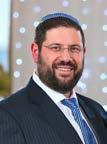
What does your Shabbat table look like? Believe it or not, this question was discussed at length in the OU Israel Center seven years ago. The Shabbat table offers parents a unique opportunity in chinuch habanim when families can reconnect in the spiritual environment that Shabbat brings. Having visited homes of many families for Shabbat, I’d sum up my experiences into three buckets:
R&R: Following a quick meal, parents enjoy their Shabbat rest and relaxation and children head to their friend’s homes to play.
Friday Night Lights: The Shabbat meal is a dynamic one, filled with lively discussions of sports, politics and current events, that are interspersed by a dvar Torah or two.

Chicken Soup for the Soul. This meal is filled with Torah discussions and singing. The environment is one of both ruchniut and menuchat hanefesh.
Recognizing the important role the Shabbat table experience can have in shaping the next generation of Jewish children, the challenge of cultivating the appropriate environment remained on my mind for many years. In 2017 I was approached by Allen Fagin, who was serving as OU’s Executive Vice President at the time. He suggested I meet Rav Elyada Goldvicht about a compelling idea he had - one that dealt with the Shabbat table.
Eager to hear his thoughts,
I met with Rav Goldvicht and he posed a challenge to me. Many working men often find themselves calling their local rav to ask halachic sheilot, and are looking to deepen their own understanding of practical halacha outside of traditional daf yomi. To support this need, Rav Goldvicht pitched The Semichat Chaver Program (SCP)…
The SCP would be an innovative, fast-paced, weekly interactive halacha learning program with material specifically designed to be easily imparted to the families of talmidim. Each semester would focus on a specific topic, with shiurim including thought-provoking questions and a dedicated segment on the taamei ha’mitzvot. Moreover, before our meeting Rav Goldvicht approached several gedolim for their haskama, and arranged that upon successfully passing a written exam, every member of the SCP would personally receive Bal-Habatim Semicha from Rav Zalman Nechemia Goldberg, Chief Rabbi Shlomo Amar, and Rav Herschel Schachter. To bring his idea home, Rav Goldvicht said that through SCP, we would change the conversations around the Shabbat table, giving families and guests engaging Torah topics to discuss.
4 TORAH TIDBITS 1502 / BO 5783
Rav Goldvicht’s energy, love and passion was palpable and I knew he’d be the man to bring this program to life. In 2017 OU Israel launched the Semichat Chaver Program together with OU worldwide, with the full support of Allen Fagin and Moishe Bane, who was then serving as OU President. At the time of its founding, Rav Goldvicht taught his first curriculum to roughly 40 students in Israel. Later that year, when Rav Hershel Schechter joined SCP talmidim to discuss the topic they were learning, I was blown away by the depth of the questions he received. I began to see the impact of the SCP, but that was just the tip of the iceberg. Today, the SCP is the fastest growing practical Halacha chaburah in the world. Rav Goldvicht’s curricula are taught in over 200 locations worldwide, reaching more than 3,800 weekly participants - and their families. Locations include Israel, US, UK, Canada, France, Belgium, Australia, China, Gibraltar, South Africa, Russia, Austria and even Chile. This past week, Rav Schechter came once again to address SCP talmidim and there was not an empty seat in the room. I stood at the back of the room and my eyes focused on someone in the crowd - an eleven-year-old boy by the name of Tzvi Yehudah Borenstein. Tzvi Yehudah’s father, Shmuel Borenstein,










OU ISRAEL CENTER 5 True wholesaler from the diamond boursa with over 25 years experience member diamond dealers club Engagement Rings ∙ Stud Earrings Pendants ∙ Tennis Bracelets 050-573-9061 jeffmor36@gmail.com www.JeffMorDiamondJewelry.com
םילשוריו ןויצ ילבא ראש ךותב םכתא םחני םוקמה
OU Israel sends heartfelt condolences to Mimi Jankovits and family on the passing of her Father z”l
has been a talmid of the SCP since its founding. Over the years, with his busy work schedule, the Borenstein children saw Shmuel use his precious vacation days to study for his SCP exams, and at the entrance of their home you will find a wall of these framed Bal-Habatim Semicha certificates. Shmuel often discusses the latest SCP shiurim around his Shabbat table.
This past week Shmuel was out of the country on a business trip and was unable to attend Rav Shechter’s shiur. Tzvi Yehudah sat in the crowd and listened intently so he could share Rav Shechter’s chiddushim with his father upon his return. While I could fill the pages of this week’s Torah Tidbits with the meaningful feedback I’ve received from SCP talmidim over the years, I’ll let Tzvi Yehudah share his reflections:
“I love learning in SCP because I learn with my father and am exposed to gedolei hador and have the opportunity to learn directly from them.”

I’ll also share thoughts I received this past week from Max Rabin, another talmid of the SCP: “The greatest pleasure of the SCP is bringing the learning into our homes to share with our families. Just this week I came home from work to find my wife and daughter discussing the amount of Pat Haba B’Kisnin that my daughter ate at dinner, trying to decide if it reached the threshold for bentching. This comes as we are learning Hilchot Berachot in shiur and we discussed these Halachot at our Shabbat table. Not to mention all of the Halachot we’ve learned about Kashrut, Keilim, Shabbat - Muktze, Bishul, Amira Lenochri and more. Bringing my kids to meet the Gedolei Hador and showing them my certificate signed by the Gedolim after passing the test connects them to our Mesorah back to Har Sinai.”
Seeing Tzvi Yehudah in the crowd of SCP talmidim, and reading stories like the one Max shared, I picture the Shabbat tables of the 3,800 SCP talmidim and feel a tremendous sense of inspiration and hope. I wish a tremendous yasher koach to Rav Goldvicht for his achievements. May HaKadosh Baruch Hu continue to bless him with endless love and passion for Torah. May SCP talmidim continue to benefit from their learning and share the sweetness of Torah with the next generation of Am Yisrael. For those who have yet to experience the SCP, visit https://www.semichaschaver.com/ to learn more. Wishing you all an uplifting and inspiring Shabbat, Rabbi Avi Berman Executive Director, OU Israel aberman@ouisrael.org


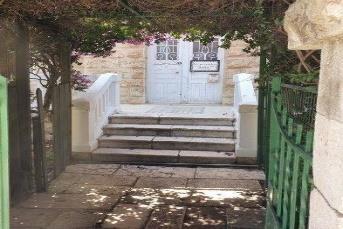

6 TORAH TIDBITS 1502 / BO 5783
Gilinski Real Estate gilinski.co.il Baka 3R, 86 SQM balcony, renovated, elevator #050-7225694 4,850,000 NIS German Colony 5R, 150 SQM, 100 SQM garden, separate unit, parking #052-6503348 Rehavia Arab house, 3R, 100 SQM, 80 SQM garden “in use” #052-6503348 13,000,000 NIS 3,190,000 NIS
and our next step will be to plant a fruit tree. I never thought of myself as being the agricultural type, but the feeling of settling and planting a portion of Eretz Yisrael, has been truly euphoric. Iy”H, when we plant our tree, and eat the fruits that will grow one day, I think we will be able to truly appreciate that unique Kedusha found in




To conclude, when you buy your Tu B'shvat fruit this year, don’t search for those dried apricots and banana chips imported from Turkey. Rather, head over to the fresh produce and buy yourself some nice juicy Kedusha-filled Jaffa oranges and thank in הבוטמ
הירפמ לוכאל, imbibing that Kedusha in every bite that

OU ISRAEL CENTER 7 OU ISRAEL CENTER 75
עבשלו
FROM THE DESK OF RABBI MOSHE HAUER

 OU Executive Vice President
OU Executive Vice President
Living and Learning
We easily see in others, and with difficulty see in ourselves, how mistakes are repeated and obvious lessons ignored. We know it is critical for us to learn from experience and yet sadly, we – as individuals and as a society – often fail to do so. How do we change this pattern?
The greatest example of this failure is Pharaoh, who hardened his heart – both on his own and by the hand of Hashemand refused to learn obvious lessons. Even when he did seem to get it, he sooner or later snapped back to his old intransigence. If we study this story of Pharaoh and the Jews closely, we can identify an effective strategy to combat this universal challenge.
Hashem had said that a goal of the miracles of the Exodus was to both help the Egyptians to know that He is G-d and move the Jewish people to tell the story of these miracles to their descendants (10:1-2). This provides a striking contrast as both the Jews and the Egyptians were equal witnesses to the miracles, yet the Egyptians allowed what they learned to be forgotten while we millennia later continue to teach it to our children, remember it daily, and commemorate its anniversary.
This contrast was presented at the
opening of our Parsha in the prelude to the plague of the locust. It was as a result of this plague that Pharaoh seemed to bend, granting us leave to serve Hashem, but then asking mi vami haholchim, who would be going. Moshe responded that to serve G-d we would go with young and old, with both our sons and our daughters. Pharaoh refused this, saying that if you are going to serve G-d then only the adult males needed to go (10:8-11).
Here lies the gap between the Jews and the Egyptians. For them it appeared that the service of G-d was reserved for the man of the house while for us it is a way of life that includes all of us, young and old, male and female. Our experiences become our values, shaping, and forming our lives and the direction we provide our children. We are not meant to simply learn something and store it away. We are to integrate it into our living and thinking and share it with our children.
This is not just a strategy to make sure our children are informed. This is how we build an attitude of learning and changing from experiences. We grow and change when we take every meaningful encounter and lesson learned and not simply pocket it, but rather build it into what we teach and share with our children and those around us. By reflecting on all we see and sharing our observations with our families, we become true lifelong learners and ensure that the lessons of life are not forgotten.
8 TORAH TIDBITS 1502 / BO 5783






OU ISRAEL CENTER 9 kerenmalki.org 02-567-0602 Keren Malki empowers families of children with special needs in Israel to choose home care. Donations are tax-approved in Israel, US and UK. Honoring the memory of Malka Chana Roth ד”יה 1985-2001, killed in the Sbarro bombing. 7 people means me. is when what those purpose next very the heard. the to accept his is the G-d, his humility. people oppoastell My MarSea Modest Swim & Casualwear www.MarSeaModest.net (NIS) www.MarSeaModest.com ($USD) Marci Rapp 050-424-8359 davidz@AshkelonProperties.com LIVE OPPOSITE THE SEA 0544-332621 said another happy client Owning your own apartment does not just allow you freedom, but offers monetary savings, and an increase in your investment value. Anglo-populated, sunny Ashkelon is the answer! It’s very affordable – from $500,000 with just a 15% down payment, mortgages available as well as bank guarantees. Rental income often in excess of 3.5%. PROJECTS, BUILDINGS AND VILLAS
and immediate occupancy.
1) Renovated 110 sqm 3
2)
50 sqm succah balcony, shabbat elevator, parking and view. 3) New 228 sqm duplex penthouse, 30 sqm succah balcony, shabbat elevator, parking and a view. GERMAN COLONY 2 bdrms, 2 bathrooms, succah+ roof terrace. OLD KATAMON 125 sqm, priv. entrance 3 exp. NIS 4,300,000 BAKA - NEWLY RENOVATED 4 bdrms, balcony, elevator, parking, storage. HAR NOF * 5 rooms, renovated, large succah, view! * Shlav B– 200 sqm garden duplex apartment. BAKA - NEWLY RENOVATED 4 bdrms, balcony, elevator, parking, storage. Eiferman Properties www.eifermanrealty.comLtd. JERUSALEM SALES FOR SALE - NEW LISTINGS RENTALS FOR MANY MORE PROPERTIES: 02-651-4030
Presales
SHAAREI CHESSED / RECHAVIA
bdrms, 1st floor, succah.
Beautiful 3 bdrm apt +
pattern: plague 8, locusts eat and destroy the vegetation. They swarm from the sky. Plague 9, darkness, no light. As if the world of Egypt is unraveling back to chaos.
ALIYA-BY-ALIYA SEDRA SUMMARY
Rabbi Reuven Tradburks
 Director
Director
of RCA Israel Region
The 8th and 9th plagues occur. Before the 10th, death of the first born, the mitzvot of Korban Pesach and of Matzah are given. The first-born die. The Jews are sent out of Egypt. Mitzvot are given to commemorate the momentous event of the Exodus from Egypt.
1st aliya (10:1-11) The eighth plague: locusts. Moshe and Aharon come to Paro: locusts will swarm, eating all vegetation left from the hail. They leave. Paro’s advisors warn him that Egypt is heading to destruction. Moshe and Aharon are brought back. Paro says: go and serve your G-d. Who is going? Moshe replies: young, old, men, women, animals. Paro refuses: only men. And sends them out.
The plagues have patterns. One pattern in these last plagues seems to be a reversal of creation. The order of creation was: day 1, light. Day 2, heavens. Day 3, land and vegetation. These last plagues reverse that
2nd aliya (10:12-23) The east wind brings in the locusts. They darken the earth, eating all vegetation. Paro quickly calls Moshe and Aharon: I have sinned to G-d your G-d. Pray to remove this death from me. Moshe does. The wind brings the locusts back to the sea. Paro does not send the people out. The 9th plague: 3 days of darkness. There is light for the Jews.
The plagues are educational. They are to teach fundamental principles of belief in G-d. Moshe states that to Paro in plagues 1, 4, and 7. So you may know that I am G-d. So you may know I am G-d in the midst of the land. So you may know that there is none as I. These are the 3 core ideas of belief in G-d that we say in the Shema – there is a G-d, He is ours (connected to this world) and He is One.
In addition, the plagues rise – from water (blood, frogs), to land (wild animals and their death) and to the sky (hail, locusts, darkness). He rules over all.
And they can be viewed as they impact our life. We know that there is a delicate balance needed to sustain life. As science advances, we become even more aware. We need water. Our bodies fight off illnesses that can be deadly. We need nutrition. A tip in the balance of nature brings natural disasters.
The plagues can be seen as if to say – this whole life of yours is a delicate balance. If it is off kilter, watch out. You are dependent on water – watch what happens when it is blood. The animal kingdom is a delicate
10 TORAH TIDBITS 1502 / BO 5783
BOKI TEITZEII
Mazal Tov to Sharon and Moshe Benzioni and Gloria and Stan Montz on the engagement of their children Hadasa and Zev
balance of predators and food. Frogs gone wild wreak havoc. Lice have their function - unleashed makes us miserable. Animals do not prey on people – when they do, chaos. Our bodies fight illness – disease and boils convey our vulnerability. Hail symbolizes the delicate balance of nature, that when upset can bring massive destruction. Our food is tenuous – locusts unleashed can bring life threatening famine. And darkness – light is simply indispensable for our functioning.
The plagues say to us – our world is a delicate balance – our individual life of water, food and illness, the animal kingdom and its wondrous balance, the natural world and its connectedness. All of this has to be just right for it all to work. And that is His Hand. His Hidden Hand calibrates all this so we don’t even notice this infinite complexity. We moderns know this increasingly every day, as science uncovers even more and more fascinating balances. The plagues hammer home our vulnerability and reliance on the Hidden Hand controlling it all.
3rd aliya (10:24-11:3) Paro calls Moshe: Go serve G-d, even your babies. Just leave the animals behind. Moshe replies: we need to take them – we don’t know what to offer til we get there. Paro: don’t ever see me again or you will die. G-d tells Moshe that after the next plague they will go free. And the Egyptians



In the heart of calm and pastoral BAKAArab house 6 rooms, 500m + possibility of building 250m, huge garden, approx. 700m, completely renovated, underfloor heating + air conditioning, large parking, 5 bathrooms, 5 toilets, green MENDEL 052-8980111
VERY GOOD INVEST! In Bustan BakaIn a beautiful boutique building – Large 2 room apartment, ground floor (0 steps), elevator, balcony, parking


2450000NIS MENDEL 052-8980111

BAKA - quiet and pleasant little street5 rooms, 175m, on one level, alone upstairs, private entrance, elevator in the apartment, high ceilings MIKAEL 052-3202488
In the heart of BAKA - on a calm and pastoral street - Spacious 5 rooms, elevator, terrace, store-room, parking, near all amenities, 5300000NIS MICHAEL 052-3202488
OU ISRAEL CENTER 11
LIVE OPPOSITE THE SEA davidz@AshkelonProperties.com call David at 054-433-2621 www.ashkelonproperties.com To purchase a sea-view home to or to that is the question. . . LIVE INRENT OUT C o n t a c t u s f o r t h e l a r g e s t s e l e c t i o n o f s e a - v i e w p r o p e r t i e s f o r s a l e o r r e n t . eitherway wearetheanswer Ashkelon
Tov to Yishai Jacobi and the Jacobi, Wolgel and Coven families on his Bar Mitzvah
Mazal
will equip the people with gold and silver. Justice is a central theme of the Torah. The injustice of the slavery must be righted – hence the promise that the Egyptians will give gold and silver, a small righting of the wrong of the slavery.

4th aliya (11:4-12:20) Moshe tells Paro of the impending plague of the first-born. Your people will plead with us to leave. Moshe leaves angrily. G-d tells him that Paro will not listen. Moshe and Aharon are given the instructions for the Korban Pesach: on the 10th of the month take a lamb for the family, guard it until the 14th, the entire Jewish people shall offer it, consume it at night roasted with Matzah and Maror, with your staff in your hand, shoes on your feet. Meanwhile I will smite all first born at midnight. This day and its celebration will be marked eternally. 7 days eat Matzah; no chametz shall be eaten for 7 days.
Matzah is to be eaten on the night of the exodus – before midnight. But I thought we eat Matzah because of the haste of the exodus? That doesn’t happen until tomorrow. Rav Menachem Liebtag points out that the seder on the night of the exodus is an antiEgypt dinner. Animals are sacred to Egypt – we roast one. And bread that rises is a proud Egyptian development. All bread in these parts is flatbread – pitas, laffa. Bread in fancy bread molds is Egyptian. So the seder on the night of the Exodus is a finger in the eye of Egypt. Your sacred animals? We’ll roast them. And your fancy Egyptian bread? Not impressed – pass me the Matzah.
5th aliya (12:21-28) Moshe instructs the people in the Pesach offering, including

12 TORAH TIDBITS 1502 / BO 5783
marking their doors with its blood. You are not to leave your home on that night. This holiday will be observed forever; when you get to the Land, observe it. Your children will ask you why; tell them because G-d passed over our homes. The people hearing these instructions bow and go and do exactly as G-d commanded Moshe and Aharon.
Imagine the faith necessary to follow these instructions. Ok, G-d has promised that the first-born Egyptians will be smitten on the 15th at midnight. And with that, we will go free. But for slaves to brazenly prepare to slaughter the sacred animals of Egypt and to roast it? Why roasting on an open fire? I don’t know, I speculate, but, well, you can’t hide the smell of a barbecue. The whole neighborhood enjoys it. The Jews are commanded to celebrate, unashamed, on full display, burning what is sacred to the Egyptians, right in their faces – before they go free!
And to magnify the confidence, the faith, the assurance, know that you will observe this forever. Before the exodus happens, they are planning to celebrate it forever. That is confidence. Faith.
When Moshe instructs the people, they did exactly as G-d commanded. Wow.
6th aliya (12:29-51)

At midnight, all the first-born in Egypt died. Paro calls Moshe and Aharon and orders them to leave to serve G-d. Quickly, so all of Egypt is not smitten. 600,000 adult men were amongst the Jews who left Egypt. The dough
blesses Yitzchak. The Jewish people will be Yitzchak and not Yishmael. -

tions of Yishmael are enumerated. Yishmael dies. Hisous and powerful offspring. The brevity

and began father’s that his icant the
BY RABBI Rav, Beit Knesset
When Avraham addresses the people of Cheit, trying to “Ger V’Toshav Anochi Eimachem” (23:4) “A Stranger and This seems to be a contradiction. If one is a stranger than
The Magid of Dubno (Jacob ben Wolf Kranz 1741-1804) this tense situation in order to, both, state his truth and be said, on the one hand, “I am a Resident’ due to G-d’s promise need your agreement to purchase a plot. In other words, Avraham “strangers”, while they understood him as saying that “they” The peace was kept, and Avraham remained true to his

OU ISRAEL CENTER 13
GET A PROFESSIONAL VISION EXAM 02-674-3888 FREE exam with purchase USING THE MOST ADVANCED DIAGNOSTIC EQUIPMENT Multifocal Experts Contact lens fittings Satisfaction guaranteed! • Wide selection of beautiful frames You Deserve a Professional Vision Exam Please call for an appointment Macabi and Meuchedet benefits 12 TORAH TIDBITS 1440 / CHAYEI SARA 5782
completes the generational transfer – He
was baked as Matzah as they could not wait for it to rise. The sojourn in Egypt was 430 years. G-d tells Moshe and Aharon the rules of the Pesach offering: only circumcised slaves, not employees, the whole people, don’t take it out of the home, one rule for all the people.
The Exodus from Egypt is a core belief: that G-d shapes Jewish history, with a Yad Chazaka and an outstretched arm. And since it is such a core belief, we have a bunch of mitzvot to keep reminding us of it. To get it to sink in. Because. Belief in an all-powerful G-d who Created the world is one thing. And Who gave us the Torah. But Who, in addition, is active in our history? That is hard to see. We live in a foggy world, where ebbs and flows of our history seem random. We had kings, then exile, then return. But then 2,000 years of exile, with far more moments where the belief in a G-d active in our history was, well, was very difficult. Challenging. Culminating in the darkest eclipse of them all in the Shoah. G-d’s Hand in history has too often, in fact most often, been obscured from our view. Where is He leading us, how is He guiding us? If belief in His Hand in history were easy, we wouldn’t need all these exodus from Egypt reminders. We have them because we need them. But for us it is a bit different. We, the
privileged generation, oh, how privileged, we, who have returned to our Land, we are truly privileged; because when we read of His Yad Hachazaka and His Zroa Netuya, His strong hand and outstretched arm – we can give a nod, yes, affirm, that He does guide our people, does intervene in our history. For us, He has made it easier.
7th aliya (13:1-16) G-d commands: all first-born people and animals of the Jewish people shall be holy to Me. Moshe tells the people: remember this day, for on it, G-d took you out of slavery with a strong Hand. When you come to the Land of Israel, observe this: eat matzah for 7 days, rid the house of chametz, tell your children that it is for this that G-d took us out of Egypt. And bind them as a sign on your arm and remembrance between your eyes. Every first-born animal is a dedicated offering. When your child asks what is this?, tell them that G-d took us out of Egypt. Bind this as a sign on your hand and a guide between your eyes, as G-d took us out with a strong hand.
The story of the Exodus mitzvot, including binding tefilin on our hand, our weaker arm, for He has the strong arm, and on our heads – these mitzvot work. The story of the Exodus from Egypt is easily the most familiar story of the Torah. Mitzvah reminders work.
HAFTORAH BO
YIRMIYAHU 46:13-28
This week’s Torah reading is well known for its dramatic description of the devastation of the Egyptian nation. We learn about the final three of the Ten
14 TORAH TIDBITS 1502 / BO 5783
Mazal Tov to Netanel Epstein, our Comics Creator, and his wife Bat-El on the birth of a baby girl, Yael
Plagues. In the haftorah, we learn about the terrible punishment that the Almighty brought upon Egypt centuries later. These were experienced through the hand of Nevuchadnezzar, King of Babylon.
Hashem conveyed his message through a prophecy of Yirmiyahu. The navi Yirmiyahu describes Egypt’s helplessness and the hardships and suffering that it will incur at the hands of the Babylonians.
The haftorah concludes on an uplifting note. The Almighty assures the Jewish people that they need not fear. Although they will experience periods of punishment in the exile, in the end they will be redeemed.
Isaac's way recognizes the necessity for great patience and forbearance. If we adopt Isaac's way, we must be prepared for a lengthy process before our challenges are resolved. In the words of Rabbi Abraham Isaac Kook, words which have been memorialized in a popular song, "An eternal people does not fear the long and arduous path."
Dreaming of a garden apartment in the heart of Jerusalem?

Torah
STATS
15th of 54 sedras; 3rd of 11 in Sh’mot Written on 205.67 lines in a Torah, 24th 14 parshiot; 8 open, 6 closed 106 p’sukim - rank: 29 (7th in Shmot) tied with Toldot & Vayigash; but larger than each one, otherwise 1655 words - ranks 21st (5th in Shmot) 6149 letters - ranks 20th (6th in Shmot) Rise in rankings results from Bo’s p’sukim being much longer than average for the Torah (longest in Sh’mot).
MITZVOT
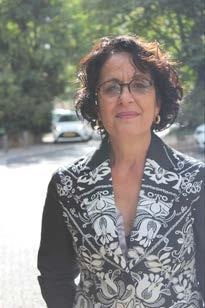
20 mitzvot; 9 positive, 11 prohibitions Last four sedras of Devarim, all of B’reishit (12 sedras), Sh’mot & Va’eira have a total of 5 mitzvot (.8%). The other 36 sedras (2/3 of the Torah) have the other 608! (99.2%)
Rare find up for sale in Lincoln St: quiet apartment with a garden within walking distance of the King David Hotel and the Western Wall. The building underwent TAMA reinforcment. Fully accessible. For pricing, information & more properties - get in touch now Batya Kenanie Bram
SEALING SERVICES Beautiful, spacious 4 room luxury unit, 2.5 baths, 2 oor, Shabbat elevator, large succa terrace, storage + covered parking. Exclusive! SHELLY LANDAU PROPERTIES LTD & EVA AVIAD REALTY bayitsheli@gmail.com www.aviadrealty.com 052-385-9944 • 054-499-9043 Rehavia-Talbieh on quiet Radak May the

OU ISRAEL CENTER 15
+972
The following verse articulates this lofty and most comforting Divine promise: “You fear not, O Jacob My servant, and be not dismayed, O Israel! For behold, I will redeem you from afar,and your children from the land of captivity, and Jacob shall return and be quiet and at ease, and there shall be none who disturbs his rest.” OU ISRAEL CENTER 15
50 791 0000
more about patient self-control than physical might. It is found in the Talmudic tractate Kiddushin 40a, where the tale is told about a certain Rabbi Zadok, who resists the attempts of a particularly powerful noblewoman to lead him astray. He exerts moral strength, and to him the Talmud applies the following biblical verse: "Bless the Lord, O His angels, mighty creatures who do His bidding, ever obedient to His bidding. Bless the Lord, all His hosts, His servants who do His will." (Psalms 103:20-21)
learned
and נ
dear
Doris Weinberger a"h ולסכ 'ד -ה"ע המלש לאקזחי תב האל הרובד Max Weinberger z”l ולסכ ז"כ -ל"ז בד ןב ךלמילא Greatly
by their children, grandchildren and great grandchildren
Yehuda
Rav
Zoom
SEALING SERVICES AND ROOFING
Patience is necessary for those who follow Isaac's way. But a wise woman taught us that patience is but another name for hope. That woman was Jane Austen, who put these words into the mouth of one of the characters in her great novel, Sense and Sensibility: "Know your own happiness. You want nothing but patience—or give it a more fascinating name: call it hope."
from this issue of TT be in loving memory
"על our
parents whose yahrtzeits are in Kislev
missed
Rav Aryeh and Dvora Weinberger Bernie and Leah Weinberger Menachem and Hannah Katten In observance of the Shloshim of our friend
Leib Berren z"l
Menachem Weinberg will give a shiur in his memory "Heroic Joy" Monday evening, 23 November/ 8 Kislev 7:30pm
Meeting: 853 8980 1519 Password: Yehuda





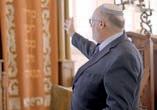

16 TORAH TIDBITS 1502 / BO 5783


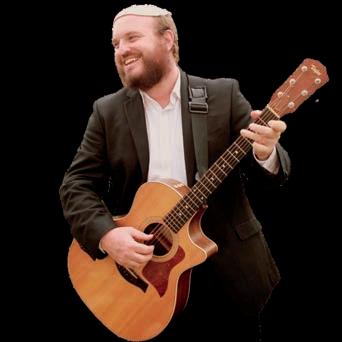








OU ISRAEL CENTER 17 ISHAY RIBO FEB 4, 2023 | 9PM | JERUSALEM SEAT TICKETS WITH PROMO CODE: TTB10 EXCLUSIVE OFFER! bit.ly/YLO-TICKETS 125TH YEAR ANNIVERSARY 125TH YEAR ANNIVERSARY 1898 2023 OUR FIRST OF MANY PROMOTIONS FOR 2023 15% 15% DISCOUNT ON ALL REPAIRS FOR ALL OF OUR PAST CUSTOMERS* DISCOUNT ON ALL REPAIRS FOR ALL OF OUR PAST CUSTOMERS* 10% DISCOUNT ON ALL REPAIRS TO WELCOME NEW CUSTOMERS* ****************RESTORE YOUR FURNITURE TO HEALTH **************** Website: www.thefurnituredoctor.co.il Email: office@thefurnituredoctor.co.il Phone: 02-999-2418 WhatsApp: 058 787 3755 *VALID UNTIL TU B'SHVAT (February 6, 2023)
COVENANT & CONVERSATION

Thoughts
The Spiritual Child
The American writer Bruce Feiler published a best-selling book entitled The Secrets of Happy Families. 1 It’s an engaging work that uses research largely drawn from fields like team building, problem solving, and conflict resolution to show how management techniques can also be used at home to help make families cohesive units that make space for personal growth.
At the end, however, he makes a very striking and unexpected point: “The single most important thing you can do for your family may be the simplest of all: develop a strong family narrative.” He quotes a study from Emory University that the more children know about their family’s story, “the stronger their sense of control over their lives, the higher their self-esteem, the
more successfully they believe their family functions.”2
A family narrative connects children to something larger than themselves. It helps them make sense of how they fit into the world that existed before they were born. It gives them the starting point of an identity. That in turn becomes the basis of confidence. It enables children to say: This is who I am. This is the story of which I am a part. These are the people who came before me and whose descendant I am. These are the roots of which I am the stem reaching upward toward the sun.
Nowhere was this point made more dramatically than by Moses in this week’s parsha. The tenth plague is about to strike. Moses knows that this will be the last. Pharaoh will not merely let the people go. He will urge them to leave. So, on God’s command, he prepares the people for freedom. But he does so in a way that is unique. He does not talk about liberty. He does not speak about breaking the chains of bondage. He does not even mention the arduous journey that lies
1 Bruce Feiler, The Secrets of Happy Families (New York: William Morrow, 2013).
2 Ibid., 274. Feiler does not cite the source, but see: Jennifer G. Bohanek, Kelly A. Marin, Robyn Fivush, and Marshall P. Duke, “Family Narrative Interaction and Children’s Sense of Self,” Family Process 45.1 (2006): pp. 39–54.
18 TORAH TIDBITS 1502 / BO 5783
תומשנ יוליעל ה״ע זייא דוד לארשי תב הדלוגו רשא בקעי ןב
ה״ע רטרש קחצי תב הינעמו בייל הירא
לאירזע
סחנפ
ןב
on the Weekly Parsha from RABBI LORD JONATHAN SACKS ZT"L
Former Chief Rabbi of the United Hebrew Congregations of the Commonwealth
May the learning of these Divrei Torah be תמשנ יוליעל HaRav Ya'akov Zvi ben David Arieh zt"l
ahead. Nor does he enlist their enthusiasm by giving them a glimpse of the destination, the Promised Land that God swore to Abraham, Isaac, and Jacob, the land of milk and honey.


He talks about children. Three times in the course of the parsha he turns to the theme:
And when your children ask you, “What do you mean by this rite?” you shall say…. (Ex. 12:26–27)
And you shall explain to your child on that day, “It is because of what the Lord did for me when I went free from Egypt.” (Ex. 13:8)
And when, in time to come, your child asks you, saying, “What does this mean?” you shall say to him…. (Ex. 13:14)

This is wonderfully counter-intuitive. He doesn’t speak about tomorrow but about the distant future. He does not celebrate the moment of liberation. Instead he wants to ensure that it will form part of the people’s memory until the end of time. He wants each generation to pass on the story to the next. He wants Jewish parents to become educators, and Jewish children to be guardians of the past for the sake of the future. Inspired by God, Moses taught the Israelites the lesson arrived at via a different route by the Chinese: If you plan for a year, plant rice. If you plan for a decade, plant a tree. If you plan for a century, educate a child.
Jews became famous throughout the ages for putting education first. Where others built castles and palaces, Jews built schools and houses of study. From this flowed all the familiar achievements in which we take collective pride: the fact that Jews knew their texts even in ages of mass illiteracy; the record of Jewish scholarship and intellect; the astonishing over-representation of Jews among the shapers of the modern mind;

is Worth

OU ISRAEL CENTER 19
Jewelry
Gold! @Fancycolors vmkdiamonds.com vmk_diamonds Jewelry Manufacturer Upgrade your old Jewelry piece to a new modern design Best rate for broken and old gold pieces, inheritances Service in Hebrew | English | French | Italian Safe & Convenient Member of the Israel Diamond Exchange & the World Federation since 1997 Pay Cash 054-397-7707 Mishael Vardi
Your
WRITING A BOOK or READY TO PUBLISH ONE? www.kochavpress.com KOCHAV PRESS produces quality books at affordable prices. 058-578-8844
the Jewish reputation, sometimes admired, sometimes feared, sometimes caricatured for mental agility, argument, debate, and the ability to see all sides of a disagreement. But Moses’ point wasn’t simply this. God never commanded us: Thou shall win a Nobel Prize. What He wanted us to teach our children was a story. He wanted us to help our children understand who they are, where they came from, what happened to their ancestors to make them the distinctive people they became, and what moments in their history shaped their lives and dreams. He wanted us to give our children an identity by turning history into memory, and memory itself into a sense of responsibility. Jews were not summoned to be a nation of intellectuals. They were called on to be actors in a drama of redemption, a people invited by God to bring blessings into the world by the way they lived and sanctified life.
For some time now, along with many others in the West, we have sometimes neglected this deeply spiritual element of education. That is what makes Lisa Miller’s recent book The Spiritual Child3 an important reminder of a forgotten truth. Professor Miller teaches psychology and education at Columbia University and co-edits the journal Spirituality in Clinical Practice. Her book is not about Judaism or even religion as such, but specifically about the importance of parents encouraging the spirituality of the child.
Children are naturally spiritual. They are fascinated by the vastness of the universe and our place in it. They have the same
sense of wonder that we find in some of the greatest of the psalms. They love stories, songs, and rituals. They like the shape and structure they give to time, and relationships, and the moral life. To be sure, sceptics and atheists have often derided religion as a child’s view of reality, but that only serves to strengthen the corollary, that a child’s view of reality is instinctively, intuitively religious. Deprive a child of that by ridiculing faith, abandoning ritual, and focusing instead on academic achievement and other forms of success, and you starve him or her of some of the most important elements of emotional and psychological well-being.
As Professor Miller shows, the research evidence is compelling. Children who grow up in homes where spirituality is part of the atmosphere at home are less likely to succumb to depression, substance abuse, aggression, and high-risk behaviours including physical risk-taking and “a sexuality devoid of emotional intimacy.” Spirituality plays a part in a child’s resilience, physical and mental health, and healing. It is a key dimension of adolescence and its intense search for identity and purpose. The teenage years often take the form of a spiritual quest. And when there is a cross-generational bond through which children and parents come to share a sense of connection to something larger, an enormous inner strength is born. Indeed, the parent-child relationship, especially in Judaism, mirrors the relationship between God and us.
3 Lisa Miller, The Spiritual Child: The New Science on Parenting for Health and Lifelong Thriving (New York: St Martin’s Press, 2015).
That is why Moses so often emphasizes the role of the question in the process of education: “When your child asks you, saying…” – a feature ritualized at the Seder table in the form of the Ma Nishtana. Judaism is a
20 TORAH TIDBITS 1502 / BO 5783
questioning and argumentative faith, in which even the greatest ask questions of God, and in which the rabbis of the Mishna and Midrash constantly disagree. Rigid doctrinal faith that discourages questions, calling instead for blind obedience and submission, is psychologically damaging and fails to prepare a child for the complexity of real life. What is more, the Torah is careful, in the first paragraph of the Shema, to say, “You shall love the Lord your God” before saying, “You shall teach these things diligently to your children.” Parenthood works when your children see that you love what you want them to learn.
The long walk to freedom, suggests this parsha, is not just a matter of history and politics, let alone miracles. It has to do with the relationship between parents and children. It is about telling the story and passing it on across the generations. It is about a sense of God’s presence in our lives. It is about making space for transcendence, wonder, gratitude, humility, empathy, love, forgiveness, and compassion, ornamented by ritual, song, and prayer. These help to give a cho ild confidence, trust, and hope, along with a sense of identity, belonging, and at-homeness in the universe.
You cannot build a healthy society out of emotionally unhealthy families and angry and conflicted children. Faith begins in families. Hope is born in the home.
These weekly teachings from Rabbi Sacks zt”l are part of his ‘Covenant & Conversation’ series on the weekly Torah teaching. With thanks to the Schimmel Family for their generous sponsorship, dedicated in loving memory of Harry (Chaim) Schimmel. Visit www.RabbiSacks.org for more.
Jerusalem Real Estate is My Business Eta: 054-723-3863 Rachel: 052-546-6425

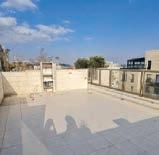
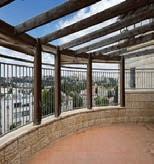

Amazing stand alone homes in OLD KATAMON, TALBIYA, BAKA, GERMAN COLONY
Allenby Complex. Across from BAKA. 160 sqm penthouse quiet with views. 4 bedrooms & 2.5 bathrooms. Shabbat elevator, sukka terrace from living room plus roof top terrace 2 parking & storage. 6,400,000 NIS
Yemin Moshe beautiful property over 300 sqm. 2 private entrances (complete separate unit over 90 sqm). large garden. Close to parking & gorgeous architectural design newly renovated. Call for more info

In the heart of BAKA enclosed in a magical courtyard: 3 bedrooms 2 full bathrooms one flight up. Beautiful spacious sukka terrace facing open gardens Completely renovated with architectual design & high level finishes. 6,250,000 NIS
Penthouse near BAKA. 154 sqm on one floor with 4 bedrooms and 2 full bathrooms. Shabbat elevator, 2 underground parking and 3 storage units!!! 25 sqm Sukka terrace off living room plus large roof top terrace. 6,250,000 NIS

Eta Morris Realty, Ltd. etamorrisrealestate@gmail.com
Eta: 054-723-3863 · Rachel: 052-546-6425 etamorrisrealty.co.il
OU ISRAEL CENTER 21



22 TORAH TIDBITS 1502 / BO 5783 UNITED HATZALAH israelrescue.org/jlmmarathon23









OU ISRAEL CENTER 23 Hod Denya Jerusalem Assisted Living For details and registration: 02-5001177 21 Golomb St., Jerusalem | Search Hod Denya on www.hoddenya.com OCCUPANCY SOON! Dreaming of Being Jerusalemites? Hod Denya, the prestigious retirement residence for the third age, is launching a first of its kind sale! Swimming Pool Theater, Movie and Lecture Hall Health Center Classes and Leisure Activities Fitness Center and Gym Organized Trips Medical Staff An Apartment in Jerusalem In Your Name in the Land Registry pay And The Rest at Occupancy *$100,000 052-2520031 Namsel@netvision.net.il Rabbi Dr. Nachum Amsel
Blessing the New Month
First Mitzva - In Aramaic?
This month shall be to you the head of the months; to you it shall be the first of the months of the year. (Shemot 12:2)
We will explore two thoughts with respect to blessing the month.
Why is Kiddush Hahodesh the first Mitzva given to Am Yisrael?
The first mitzva commanded to Am Yisrael is with respect to blessing the new month – Kiddush Hahodesh. It seems a bit anticlimactic to select this as the first commandment rather than something a bit more exciting and fundamental. We have referenced the explanation offered by the Seforno. This was commanded to a generation of slaves. A slave is not in control of his own time. His master tells him when to work and when to take a break. Now that we are free, we are to act responsibly with our time and to avoid wasting the gift of time. We should cherish the “present”.
Essentially, the mitzva is to take control of time by sanctifying the new month and later each moment as well.
Why Are Months in Aramaic?
The Midrash (Shir Hashirim Raba chapter 4 and Vayikra Raba 32), states that we merited the exodus because during our exile in Mitzrayim, two of the four meritorious acts that we performed included retaining Jewish names and speaking lashon hakodesh. Amazing. Practically, what enabled us to survive in galut, was the fact that we preserved our Jewish heritage by maintaining our Jewish names and language.
If maintaining our Hebrew names and language is so crucial, why is it that when Bnei Yisrael returned to Israel during the rebuilding of the second Beit HaMikdash, they continued to use the names of the Persian months. In the Torah, months don’t have names; they are referred to by numbers. We count from “Nissan,” by the number of the first month. The only yahrzeit we have in the Torah is of Aharon Hakohen which occurs on the first of the fifth month. In Megillat Esther, we have references to Adar and Iyar, which are Persian names for months. Why didn’t Bnei Yisrael revert to referring to months by numbers after they returned during Bayit Sheni? Why do we still refer to months by their Persian names?
Moreover, why is the Talmud Yerushalmi, which was compiled by Rabbi Yochanan in

24 TORAH TIDBITS 1502 / BO 5783
Rav Kehilla, Nofei HaShemesh Maggid Shiur, Daf Yomi, OU.org Senior Ra"M, Kerem B'Yavneh
RABBI SHALOM ROSNER
יֵׁשְדָחְל ם ֶכָל אּוה ןֹוׁשאִר םי ִׁשָדֳח ׁשאֹ ר םֶכָל ה ֶּזַה ׁשֶדֹחַה )ב:בי תומש( :הָֽנָּׁשַה
Mazal Tov to
Bob & Mindy Zeiger and family on the birth of a granddaughter
Jerusalem, written in Aramaic? One would have expected that it be written in Hebrew!



Rav Yaakov Kamenetzky explains that even when Klal Yisrael returned to rebuild the second Beit HaMikdash, they knew that this was not the ultimate redemption. They were lacking the Aron HaKodesh! The urim vetumim didn’t light up, either. This was clearly not a complete redemption!

The reason behind using Persian names for months, and the explanation as to why the Talmud Yerushalmi was written in Aramaic, is to serve as a reminder that any salvation being experienced is temporary and incomplete. Although we have come a long way, our redemption, our geula, is not complete.


In our generation we have be zoche to experience a giant step in getting closer to the geula. May we merit a guela shlema b’meherah b’yamenu!
www.angelrealty.co.il




For Sale in The Village, Zayit, Eftat Stunning 210m 8 room cottage, 2 private parking spots, central A/C. 4,800,000 NIS
For Sale in Dagan, Efrat Stunning 8 room cottage, middle unit. 3 floors, 230m. 5,250,000 NIS For Sale in Gefen, Efrat Beautiful 5 room duplex garden 2,850,000 NIS For Sale in Dagan, Efrat 5 room garden apt. 120 meters 2,990,000 NIS

For Sale in Olive Project, Zayit, Efrat Gorgeous 4 room apt. 120m. 2,850,000 NIS For sale in Zayit, Efrat 6 room duplex apt. 2,850,000 NIS Contact Gabi for more info 0524588716





OU ISRAEL CENTER 25
Gabi- 0524588716 OU ISRAEL CENTER 55 “TzviAir is a pleasure to work with and did an amazing job!” – Jamie Geller, Celebrity Chef AIR CONDITIONING SALES & SERVICE 02-628-8282 | tzviair.com shmuelnathan4@gmail.com
SMILES
Bed’s Barometer






















The night of Yetziat Mitzrayim has finally arrived, and the first-born sons of every Egyptian family are dying by the dozens. The Torah describes the screaming that abounded across the country, no household is left untouched. Suddenly, Paroh gets up in the middle of the night, frantically begging the Jews to leave his country. “Vaykam Paroh Laylah – and Paroh got up that night” (Shemot 12:30). Rashi’s comment consists of one word only, yet in this one word lies deep mussar. Rashi says, “mimitato – [Paroh got up] from his bed.” What is Rashi teaching us here? Where else should a person be in the middle of the night, if not in his bed?

In his inimitable style, Rashi’s succinct comment encapsulates profound lessons. It
seems that Paroh, a firstborn himself, was not the least bit perturbed about Moshe’s prediction! His country is in shambles and he is snoozing! How are we to understand this? Did Paroh not see that the previous nine plagues were enacted with the exact precision as prophesied? What enabled Paroh to sleep, perfectly unconcerned in his bed that fateful night?






Rav Friedlander z”l, in Siftei Chayim suggests that Paroh’s behavior is characteristic of one who acts with tunnel vision, only dealing with the circumstances in the present moment. When each of the plagues came, he agreed to let the Jewish leave Egypt, but his reaction was only to alleviate the immediate discomfort he was experiencing. He didn’t actually think of the consequences of his decision. Hence, on the night of makat bechorot, his only consideration was to get a good night’s sleep undisturbed by thoughts of what would happen in a few hours. Chazal teach


26 TORAH TIDBITS 1502 / BO 5783 REBBETZIN SHIRA
Faculty, OU Israel Center
OTHER OPTIONS AVAILABLE | RAMAT BEIT SHEMESH | JERUSALEM | ASHDOD | ASHKELON | TZFAT | RAANANA | TEL AVIV BEER SHEVA PROJECTS HIGH DEMAND 3,4,5 ROOMS AND PENTHOUSES CLOSE TO PARKS , SCHOOLS , SHULS AND TRANSPORT www.israel-properties.com| Tel/WhatsApp IL +972 50 446 9515 | Office +972 2 568 6578 | toviyah@israel-properties.com GUIDING YOU EVERY STEP OF THE WAY HELPING YOU SECURE YOUR FUTURE IN ISRAEL WITH PROPERTY OWNERSHIP AND INVESTMENT NETANYA PROJECTS NETANYA STUNNNING 4 ,5 ROOMS AND PENTHOUSES – VARIOUSE OPTIONS AND PROJECTS TO SUITE ALL BUDGETS BAT YAM PROJECTS WALK TO BEACH , SEA VIEWS , WALK TO LIGHT RAIL BE IN TEL AVIV IN 15 MINUTES HIGH LEVEL FINISHES 4 ROOMS AND 5 ROOMS NEVE SHAMIR NEW PROJECTS HIGH DEMAND CLOSE TO ALEPH AND MISHKAFAYIM 3,4,5 ROOMS GARDENS AND PENTHOUSES RAMAT BEIT SHEMESH DALED NEW HIGH LEVEL PROJECT – SPACIOUSE UNITS CLOSE TO ALL AMENITIES IN NEIGHBERHOOD VARIOUSE OPTIONS CONTACT US TODAY JERUSALEM NEW PROJECTS VARIOUSE PROJECTS AND OPTIONS TO SUITE ALL BUDGETS IDEAL FOR LIVING AND INVESTING IN THE HOLY CITY Toviyah +972 50 446 9515, Daniel +972 53 444 0928 , Lara +972 58 661 1968, Yehudah +972 52 564 0130, Debbie +972 58 322 9858
us (Avot 2;13), one who is wise anticipates the future. We need to be keenly aware, to evaluate and consider the present and future consequences of our actions.

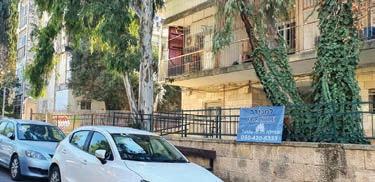

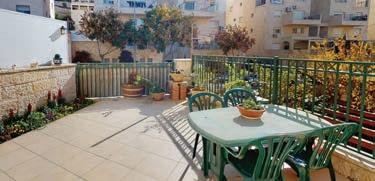








Rav Birnbaum z”l, in Bikarei Shemo sees another dimension of Paroh’s personality in this detail. Paroh epitomizes one who refused to capitulate to a higher force. He truly believed until that very night that he was greater than Hashem. Yes, he admitted that Hashem may be more powerful, but he was not willing to accede that Hashem was necessarily greater. It was this strength of spirit and resolve that motivated his behavior to sleep at a time of national crises. It was only when the horrendous devastation of makat bechorot became apparent that he realized his foolishness and how much harm he had caused within his people. The depth of the screaming that transpired that night conveyed this stunning realization. How wrong he had been to lead his people to believe in such a faulty perspective! And how catastrophic the consequences of this very mindset!
Rav Birnbaum takes an insightful lesson from Paroh’s conduct and attitude. We can use the same power he did, the strength of spirit to believe in something all the way and channel it toward our avodat Hashem. It is so easy to get distracted when doing a mitzvah, it is so common to feel that our impact is limited. When we can harness this determination, we will succeed in acting on our beliefs with true fullness of self. Just as Paroh was able to sleep comfortably in his bed that night, we can hold on to our beliefs and values despite any outside pressure that threatens to control us.
OU ISRAEL CENTER 27 BS″D Real Estate | Investments | Management services Noam Homes Listing Agency that sells! Scan to visit our site www.noamhomes.com Scan to visit our site www.noamhomes.com Real Estate | Investments | Management services www.noamhomes.com | office@noamhomes.com Noam Even 058-793-2222 Real Estate Office in HA PY duplex, built to a Lot with with Complex private NACHALAT ACHIM GERMAN Look for us: NOAM HOMES Noam Homes 24 Even Sapir St., Jerusalem 058-793-2222 office@noamhomes.com FOR SALE FOR SALE FOR SALE FOR SALE FOR SALE 735m² lot, built 265m², 60m² pool, 5 BR, 4.5 bathroom 3BR, 2 bathrooms, Ground floor out of 5, 81m² 3BR, 116m², (originally 4BR), 2 bathrooms, 3 balconies (22m²) 2BR, 60m² (43m² in Tabu). Yard in exclusive use ~30m² Spacious 4.5BR penthouse, 140m², roof terrace with view Amazing Tuscan style House, Moshav Luzit Apt with a gorgeous view! Har Homa, JLM Spacious, renovated apt, Young Arnona, JLM Renovated garden apt, Rechavia, JLM Spectacular penthouse, Old
Katamon, JLM
MISCHEL
To Truly See Another
Jews came from far and wide to the modest Bnei Brak apartment of Rav Yaakov Yisrael Kanievsky, zt’l, the Steipler Gaon, to consult and discuss Torah topics, and seek the blessings and advice of the one of the generation’s great sages and poskim, ‘guides in halachah’. The renowned author of the multi-volume Kehillos Yaakov on the Talmud, the Gaon was recognized not only as one of the great Torah minds of our time, but as a sensitive, caring heart.
By the end of each day there was a large stack of kvitlach piled on his desk, handwritten notes with names of petitioners and specific requests to daven for. One evening, the Steipler noticed an overly curious family member perusing some of the kvitlach, and firmly admonished him, “Kuk nisht, don’t look!”
As the family member, embarrassed that he had acted inappropriately, slunk away, he heard the Steipler say under his breath, “You will not be able to handle the pain!”
As part of retribution for suffering at hand of the Egyptians, our sedra recounts Makas Choshech, the Plague of Darkness, cast a heavy darkness over the land: ּואָר־אֹל יֵנְּב־לָכְלּו
םָתֹבְׁשֹומְּב רֹוא הָיָה לֵאָרְׂשִי, “No man could see his brother, nor could anyone rise from his place, but for Bnei Yisrael there was ohr ba-moshvosam, light in their dwellings” (10:23).
Rebbe Yitzchak Meir of Gur, the Chidushei haRim taught that there is no greater darkness than one in which “a man saw not his fellow”; in which we are unaware, blind or oblivious to one others’ needs. Enveloped in darkness and unable to see each other, we become distanced from our neighbors and friends, self-absorbed and stuck in our own personal issues and pursuits. As in the physical Plague of Darkness, “nor could anyone rise from his place...” When we are unable to see our fellow Jew, the result is lo kamu, we ‘cannot rise from our place’, we are not able to elevate ourselves and grow. Makas Choshech therefore represents a spiritual darkness in which we are stuck in ourselves, unable to move, unable to see beyond our own needs.
It is natural to wince and want to avert our eyes from witnessing something scary or unpleasant. It can be difficult to see and relate to the pain others are living with and to open our eyes and heart to their difficulties. Our experience in Mitzrayim recounted in Makkas Choshech reminds us to do our best to see others and their experiences, needs, and feelings, in the same way that we want to be seen. To nosei b’ol im chaveiro, “help carry the yoke of one’s
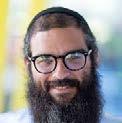
28 TORAH TIDBITS 1502 / BO 5783
RABBI
Mashpiah, OU-NCSY Executive Director, Camp HASC Author of Baderech: Along the Path of Teshuva (Mosaica 2021)
JUDAH
םיִמָי תֶׁשֹלְׁש ויָּתְחַּתִמ ׁשיִא ּומָק־אֹלְו ויִחָא־תֶא ׁשיִא
fellow” goes beyond just noticing them; it is also lovingly making space for them to share what they are going through, and to shoulder the weight of their pain so they can unburden themselves.
Cultural anthropologist Dr. Susie Greene has stressed the central role of ‘seeing one another’ in establishing intimacy and strengthening relationships. She suggests that eye contact sends a powerful, non-verbal message that “I see you, I acknowledge you, I connect with you….”
Living in the redemptive light of ahavas Yisrael, we are able to turn toward our friends and fellows with deep connectivity, recognize them and convey, “I see you.” May we be blessed to open our eyes and hearts and bask in the light and joy of revealed good, and may all of Am Yisrael merit ohr ba-moshvosam, light in their dwellings.
Science, M’Rabanan




















A weekly shiur Sundays at 10 a.m.


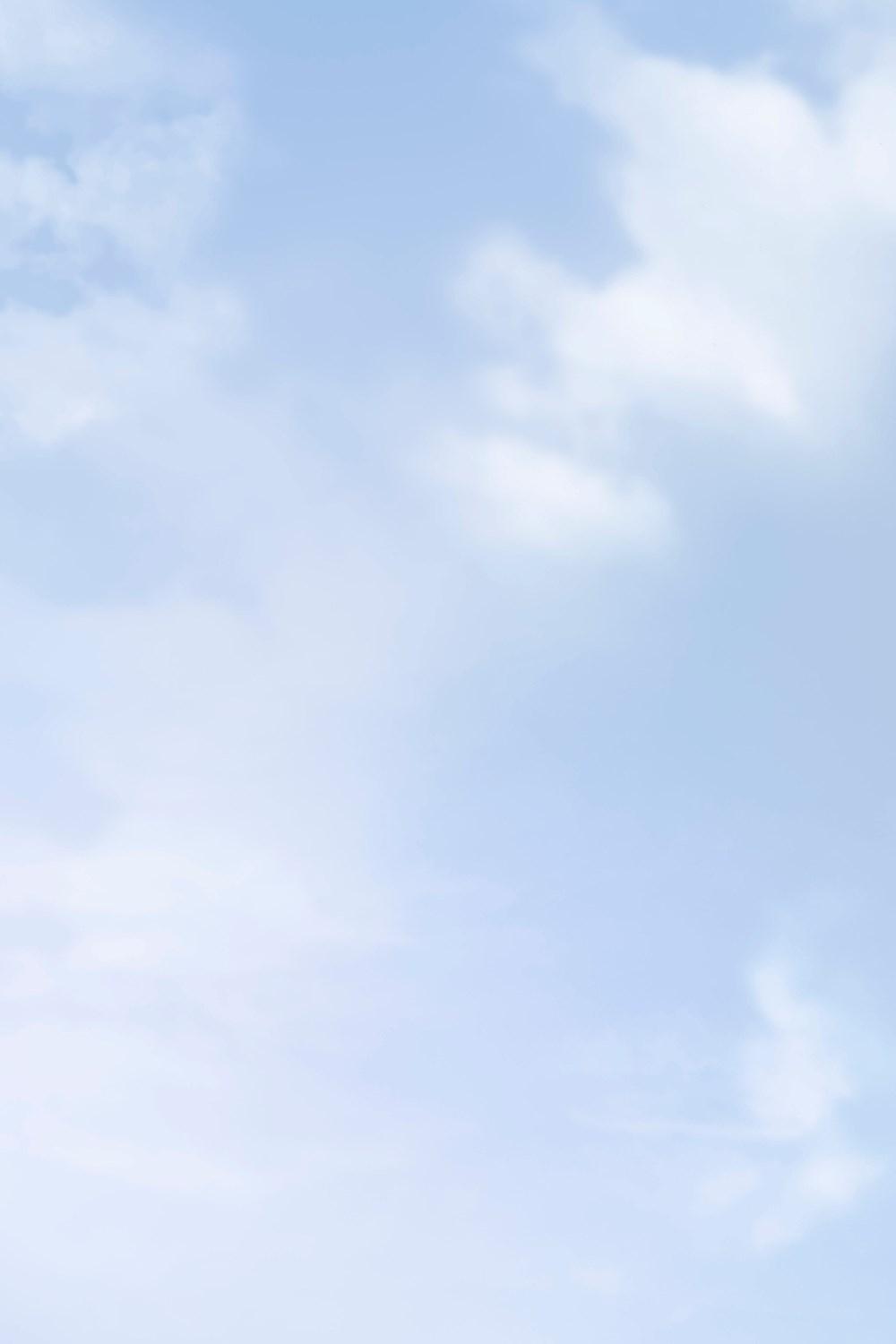
Discover the revolutionary program taking the world by storm: a concise learning method, from the Talmudic source through modern-day halachic application, with a focus on practical Halacha. No prior knowledge necessary. In person and on Zoom.

Both shiurim are being given by Rabbi Joel Kenigsberg. All are welcome and there is no charge. Go to bkhanassi.com for Zoom links
A 5-part series Wednesdays at 8 p.m. begins January 18th


What does the Torah have to say about lab-grown meat, self-driving cars, artificial intelligence and other novel technological breakthroughs? In person and on Zoom.


Tzurba Technology Halacha &
Beit Knesset Hanassi
Young Israel of Rehavia 24 Ussishkin Street Jerusalem

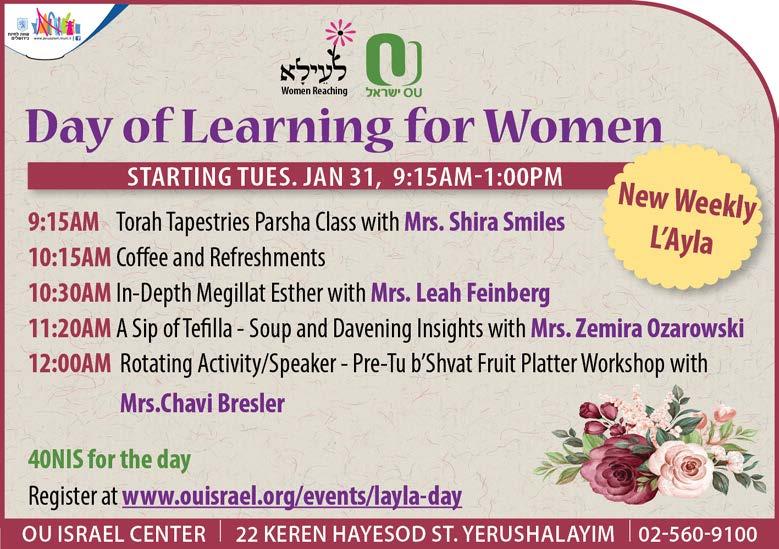
30 TORAH TIDBITS 1502 / BO 5783


OU ISRAEL CENTER 31
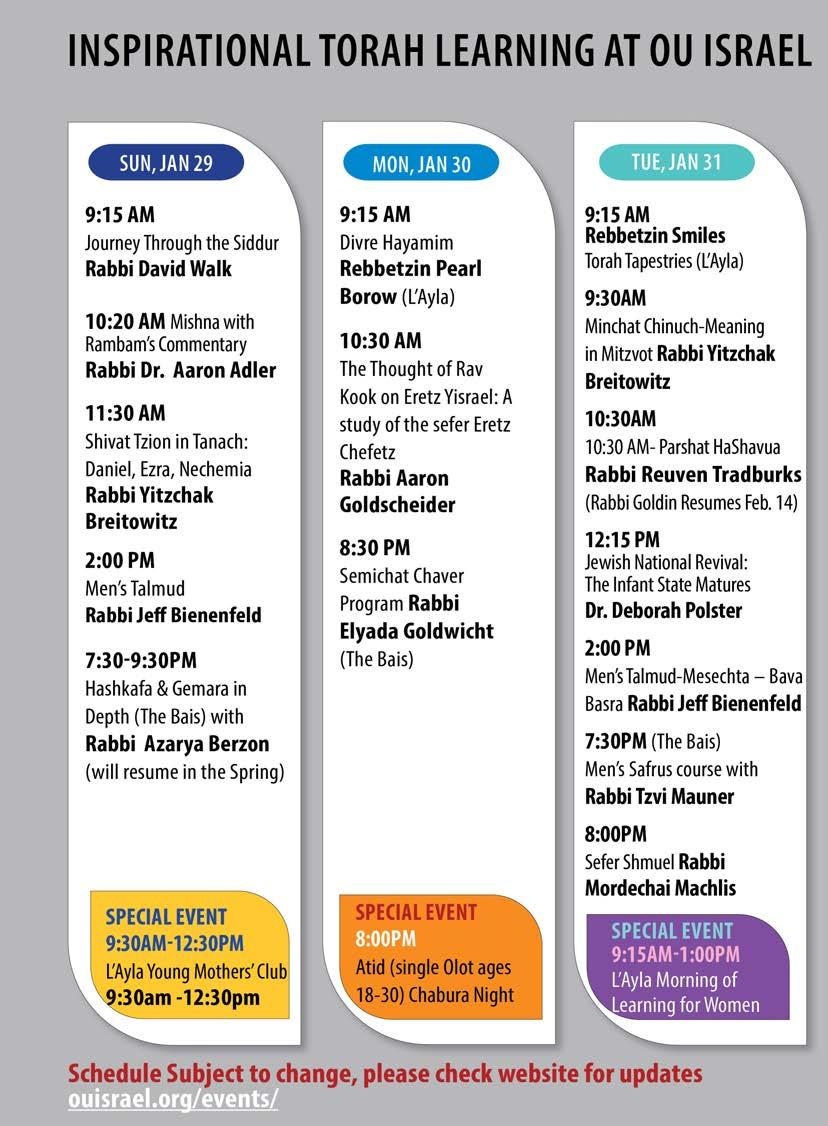
32 TORAH TIDBITS 1502 / BO 5783
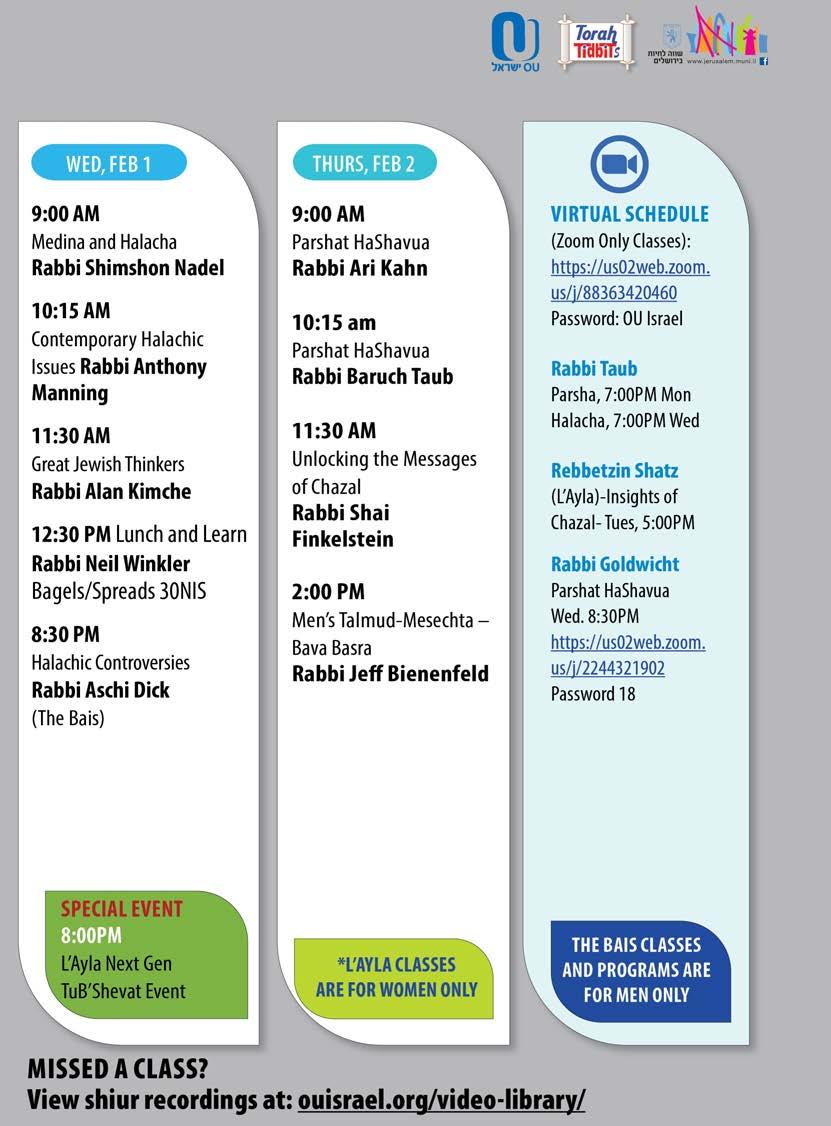
OU ISRAEL CENTER 33


34 TORAH TIDBITS 1502 / BO 5783

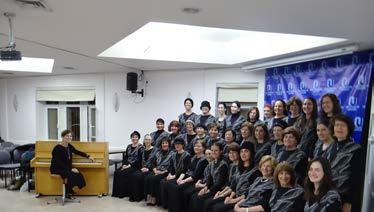

OU ISRAEL CENTER 35 PRI HADASH WOMEN'S WRITING WORKSHOP AT THE OU ISRAEL CENTER Monday mornings 10.30-12.30 For more details, call Ruth 02-628-7359 or Judy 054-569-0410 DOROT - The OU Women's Intergenerational Choir Director Hadassah Jacob 052-384-7230 Monday Evenings 7:00 - 9:00pm
• Checks: Make out to “Yesh Ezra” Send to: Yesh Ezra, POB 36156, Romema, Jerusalem

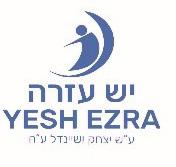

• Bank Transfer: Bank Mercantile (17), Branch 642, A/C 79747843, Yesh Ezra • Credit card by phone: Sara at 077-820-0196 (Sun-Thu. 10:00am-3:00pm) • Website: www.yeshezra.org Click on “Donate Now” Inquiries: Menachem Persoff 050-570-1067 menpmp@gmail.com


36 TORAH TIDBITS 1502 / BO 5783 Join OUr Purim Campaign Donate through our website www.ouisrael.org/purim Give Pre-Purim Mishloach Manot to heroic IDF soldiers, including OU Israel Youth Centers alumni Price: $18 / NIS 70 רעונה יזכרמ בלב םוקמ אתיירואד or scan the code Donations made to the OU Israel are tax deductible
This week: Funds urgently needed for post-operative special shoes following knee surgery

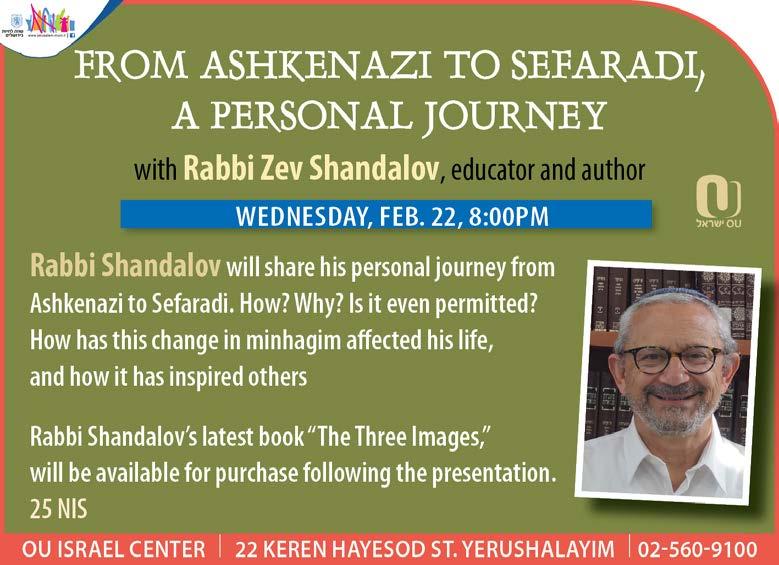
OU ISRAEL CENTER 37
SHIUR SPONSORS
Tuesday, January 24th - Rebbetzin Shira Smiles’ shiur was sponsored by Chana Spivack in loving memory of my dear mother - Tova Yenta bat Zev and Pesha a”h whom I have grown to appreciate more and more every year. The 2nd of Shvat is her 14th Yahrzeit
Thursday, February 2 - Rabbi Shai Finkelstein’s shiur is sponsored by Joyce & Michael Vogel in loving memory of Joyce’s father ל”ז יולה והימרי ןב ןורהא Rabbi Goldscheider’s shiur has been sponsored for the 2023 Academic Year ל’’ז המלש ןב בוט םשו ה’’ע םהרבא תב םירמ תמשנ וליעל
Rebbetzin Shira Smiles shiur is sponsored for the 2023 academic year by Dr. & Mrs. Menachem Marcus in memory of their parents, Rose & Dr. Emanuel Marcus z”lל”ז סוקרמ השמ ןב יכדרמו ריאמ ףסוי תב לזייר Rosi and Ernest Strauss z”lל”ז סוארטש דוד ןב לאינדו םהרבא תב דומיל
Rabbi Breitowitz’s Tuesday Shiur - Minchat Chinuch is sponsored for the academic year 2023 by Rabbi Refoel & Sharon Auman in memory of their parents Edith & Reiner Auman z”l ד”יה לאפר תב ה”ע רתסאו ל”ז קודצ ןב הנוי and their son Rabbi Shmuel Eliyahu Auman z”l י”נ לאפר ברה ןב ל”ז והילא לאומש ברה
Rabbi Goldin’s shiur is sponsored for the 2023 academic year by Dr. & Mrs. Menachem Marcus in memory of beloved aunts Irma Haas a”h and Hilde Myer a”h
Rabbi Manning’s shiur has been sponsored for the 2023 academic year ל’’ז ןמלק ןב גילזו ה’’ע תידנרב תב הנרב תמשנ יוליעל
Rabbi Taub’s weekly Thursday Parshat HaShavua Shiur is sponsored by The Jewish Legacy Foundation
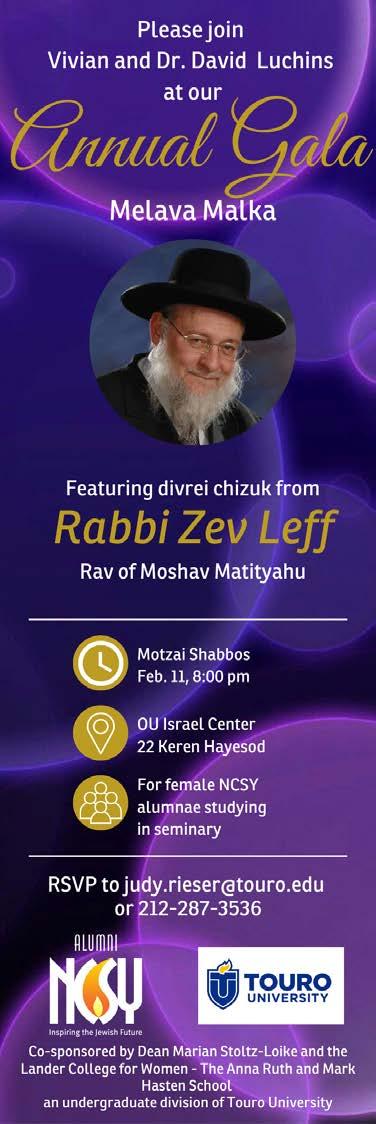
38 TORAH TIDBITS 1502 / BO 5783
NACHI REALTY 054-461-3943 New building under construction in a great location. 3 rooms only 2.47m shekel. 4 rooms available as well from 3.27m NIS 4 rooms on Chizkiyahu HaMelech in Katamon, 2nd floor, beautifully renovated, 2 full bathrooms. 3.49m NIS

OU ISRAEL CENTER 39
SIMCHAT SHMUEL
BY RABBI SAM SHOR Program Director, OU Israel Center

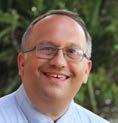
arshat Bo introduces us to the mitzvah of the Korban Pesach. In the pesukim which follow the detailed instruction to take and prepare the Korban Pesach, we read:
child has separated himself and deserves a harsh response.
And when you enter the Land that Hashem will give you, as promised, you shall observe this ritual. (26) And when your children ask you, ‘What is the significance of this ritual for you?’ (27) you shall say, ‘It is the Pesach offering to Hashem....
Ma HaAvoda HaZot Lachem-What is the significance of this ritual for you?- These words are familiar to each of us as the question asked by the Haggadah's proverbial ‘Wicked Child,’ the Rasha. The Haggadah text goes on to suggest that since this wicked child seems to detach themselves from this fundamental mitzvah, and asks What is the significance of this ritual for you, the
In a stirring teaching, the Ohalei Yaakov, Rebbe Yaakov Friedman of Husiyatin zy’a, points to this verse to offer commentary on the apparent lack of spiritual awareness among many of the younger generation that were engaged in building Medinat Yisrael, both in the years leading up to the establishment of the State, and in the subsequent early formative years of the State of Israel. In a powerful sicha offered in 1942, the Rebbe shared these words to his community in Tel Aviv:
The Midrash in the Mechilta explains our verse-and it shall be when your children ask you what is the significance of this ritual for you. The verse stipulates that even if the children declare and question-what do the mitzvot mean to you, as if to suggest they have no significance for themselves, even so the verse still teaches us that they remain our children, and they remain Hashem’s children....
To our great dismay, many of the younger generation in Eretz Yisrael today, if we ask them why do you not safeguard the sanctity of Shabbat, why do they eat prohibited foods, why do they stray from holiness and modesty, they will answer us, either directly or with similar words, Ma HaAvoda HaZot Lachem...
40 TORAH TIDBITS 1502 / BO 5783 P
רֵּבִּד ר ֶׁשֲאַּכ ם ֶכָל ’ה ן ֵּתִי ר ֶׁשֲא ץֶר ָאָה־לֶא ּוא ֹבָת־יִּֽכ הָיָהְו’... םֶכיֵלֲא ּו רְמאֹי־יִּֽכ הָיָהְו )וכ( ׃תאֹּֽזַה הָדֹבֲעָה־תֶא ם ֶּתְרַמְׁשּו אּוה חַסֶּפ־חַבֶֽז ם ֶּתְרַמֲאַו )זכ( ׃םֶֽכָל תא ֹּזַה הָדֹבֲעָה ה ָמ ם ֶכיֵנְּב ’הַֽל
Rachel Feld Certified Personal Trainer 054-471-8420 Personal training is for you! Frustrated that you can't get into shape? Don't have the time or motivation to go to the gym? Diastasis recti rehabilitation Work out in the comfort of your home Senior fitness change begins with you.
GET FIT WHILE YOU SIT: Exercise for ladies Join us on Sundays 12:45-1:30pm at the OU Israel Center Sura Faecher 0504153239
However the Mechilta teaches us, that these children remain our children, and we need to look to see their endearing qualities which remain. Indeed our youth demonstrate many good character traits, they are concerned for one another, they welcome refugees into their tiny homes, they give of their soul for the sake of their fellow Jew and for the sake of the Jewish people, these fine qualities are a sign, that Hashem’s promise that the Jewish people will return to the Land, and return unto Him, will indeed come true...

Yehi Ratzon may the Rebbe’s beautiful words serve as a source of chizuk for each of us, may we be inspired to see the good in every single member of Klal Yisrael, and may we see the fulfillment of Hashem’s promise, that His children will indeed return to the Land, to the ways of Torah and mitzvot, and to Hashem Yitbarach.

Beit Knesset Hanassi

OU ISRAEL CENTER 41
GEULAS YISRAEL
BY RABBI MOSHE TARAGIN R am, Yeshivat Har Etzion
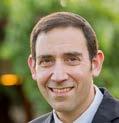
Tell the Story
Hashem always prefers human partners for the process of historical redemption. The entire premise of the book of Shir Hashirim implies that history is a duet, between Hashem and His people who jointly reshape history. It is precisely this partnership, its immense challenge, and the steep price it sometimes demands from us, which causes Hashem to love us so deeply. Historical vision courses through the pages of Shir Hashirim and imbues the sefer with romance and passion. Hashem desires historical partners.
This was true in the first redemption of history and has been true ever since. Sadly, the Jews of Egypt were so dispirited by oppressive slavery and crushing brutality that they were rendered completely impassive. Addressing the slaves, Moshe sketched a vision of a brighter future, but their imaginations were too tightly shuttered to wrap their heads around that dazzling future. Too overwhelmed with work and too mired in sorrow they could barely breathe, let alone imagine a better tomorrow. השמ לא ועמש אלו השק הדובעמו חור רצוקמ. At this point, the nation goes quiet: no prayers, no rebellion, and no activism. Hashem lacked a partner.
As redemption gathers momentum though, something must be done to awaken our dormant imaginations and to galvanize
us as partners in our own redemption. Eventually, on the night of the actual Exodus, our spirit was revived by the iconic ceremonies and rituals of the first seder in history. However, a few months before, as the final makkot ebb to a close, Hashem wanted to awaken our spirit and beckon us as active participants in our own redemption. What could possibly arouse our slumbering imaginations?
Story Tellers
In the introductory verses of Bo we were informed that we would, one day, retell the story of Exodus to our grandchildren. ןַעַמְלּו ־תֶאְו
. Somehow, the expectation of “storytelling” rouses our depressed spirit, and propels us into redemptive mode. Narrating the story of slavery and redemption fired up our vision and stirred our inspiration.
Telling a story is a mentality, not just an exercise. When people sense that their personal lives are part of a ‘larger story’, imaginations are transformed. Generally, stories are told about epic events with consequential outcomes; stories rarely speak of common or humdrum moments of daily life. By viewing our lives as part of a larger story we realize the import of our behavior and the magnitude of our decisions. Living life as part of a story lends consequence to otherwise bare experiences.
Retelling this dramatic story of slavery and
42 TORAH TIDBITS 1502 / BO 5783
י ֵנְזָאְּב
יִנֲא־יִּכ ם ֶּתְעַדיִֽו ם ָב יִּתְמ
םִיַרְצִמְּב יִּתְלַּלַעְתִה ר ֶׁשֲא ת ֵא ָךְנִּב־ןֶבּו ָךְנִב
רֵּפַסְּת קָֽוֹקְי
ַׂש־רֶׁשֲא י ַתֹתֹא
redemption transformed the hollow lives of slaves into the historic lives of free men. Slaves exist in perpetual “survival mode” barren of any larger meaning. The notion of retelling their story to future generations, conferred meaning and historical sweep to the lives of newly minted fathers and grandfathers. Slaves cannot imagine family and future, but free men are able to ponder the future and envision their heritage.

Viewing our individual lives as a “story” liberated our crushed spirits, unlocked our shuttered imaginations, and activated us as partners in redemption. Hearing that we would bear grandchildren, provided a horizon of hope that something grand loomed beyond the stony pyramids and the hot sands of the desert.
The knowledge that our lives belong to a larger story infuses us with purpose and vision. Knowing that our decisions will ripple through future generations lends deeper meanings to otherwise empty lives.


A Sad Story
Many modern Jews have become less attuned to the larger Jewish story. The story of Jewish exile is a mixed narrative of tragedy and triumph. Facing incalculable odds, we didn’t just survive but thrived. Not only did we thrive, but we steered humanity toward monotheism, morality, and to a more civil and just social order. Yet, we also faced endless hatred and discrimination, and, to many, the past two thousand years of Jewish history are more depressing and tragic than they are remarkable. As the modern Jewish world has become more prosperous, politically secure, and economically affluent, it has become more challenging for some to relate to the struggles of past Jewish history.




OU ISRAEL CENTER 43
054-527-9356 DIRTY AIR, DAMP & MOLD GREEN TREATMENT EXPERTS - Corona Cleaning - Deodorization - Leak Detection Systems - Waterproofing - English + Hebrew Reports - Working at heights - Insured - Quality House Painting QUICK ESTIMATE/FREE ADVICE :)
In the past, Jews lived under more dire circumstances and this compromised state created an immediate alliance with past generations. Hatred and violence felt eerily similar to the past “chapters” of the Jewish story, and we felt as if we were living alongside the past. Thankfully, much of the world has turned friendlier toward Jews, but this improvement has made it difficult for some to deeply identify with our larger historical story.
Additionally, the horrors of the Holocaust brought our story to a screeching halt. During this horrific nightmare, so much of the European Jewish life we had built over centuries was demolished. Occurring toward the conclusion of Jewish exile, the Holocaust cast an ugly pale over that entire experience. The darkness of the Holocaust obscured the past, hampering our ability to look back at exile, appreciate both its sadness as well as its glory, and identify with the long march of Jewish history. For many
A SHORT VORT
Jews, the grief and frustration of the Holocaust created a historical disconnect.
Unfortunately, detachment from Jewish history is risking a crisis of Jewish identity. Stories provide us with belonging, anchor us to tradition and brace Jewish identity. Jewish identity disconnected from Jewish history can be very rickety.
Baruch Hashem our generation is witnessing a surge in Torah study and advances in ritual halachic practice. Yet we are also experiencing a decline in our sensitivity to Jewish history. Religious fervor rises and dips and assembling religious identity solely upon religious practice is a risky proposition. Stories often last longer than religious devotion.
The Land of Our Story Daily life in Israel is more permeated by our national story. For two-thousand years, the book of the Jewish history was sealed. Prophecy ended and Jews became sidelined as the victims of history. With our return to
BY RABBI CHANOCH YERES R av, Beit Knesset Beit Yisrael, Yemin Moshe
In memory of the Yarzheit of my Father-in-law, Rabbi Yisroel Fass zt”l which falls on 11th of Shevat. I was introduced to the Sefer “Oznayim L’Torah” (Rabbi Zalman Sorotzkin 1881-1966) by my late fatherin-law and would like to share one of his thoughts. In Pasuk 12:39, it states: “And they baked the dough which were brought forth from Egypt, unleavened cakes, because they were thrust out of Egypt, and they were not able to tarry.” המהמתהל ולכי אלו
The Sages teach us that had we stayed any longer in Egypt, the Israelites would have sunk unto the lowest level of impurity and abominations, dashing any hopes of redemption.
Yet, the question is raised, throughout the years of bondage the Israelites kept certain traditions like their way of dress, their language or their names. If the Israelites succeeded in keeping these traditions, were they truly in danger of assimilation?
Furthermore, being in the present exile of over two thousand years, if there is a clear and present threat of assimilation now, how could G-d allow us to remain in this exile any longer?
Rabbi Zalman Sorotzin answers that we see from here, that we are less susceptible to outside pressure than our ancestors in Egypt. The answer is that the “Jewish nationalistic ideas”, like garb, language and names, that preceded receiving of the Torah at Mount Sinai gave very little protection against assimilation. Yet, our exile which transpired after receiving the Torah, gives us ample safeguard from outside influences, if we continue to observe it. Shabbat Shalom
44 TORAH TIDBITS 1502 / BO 5783
our Land and to the front stage of history, our book has been reopened.
Seven years ago we faced a wave of Arab terror which included several drive-by shootings and as well as random stabbing attacks. Two of the first victims of this violence were the son and daughter-in-law of Chanah Henkin, a pioneer of women’s Torah education in Israel. I visited her for shiva in her cramped apartment in Yerushalayim. At one point a group of American students entered this small shiva setting accompanied by their teacher. It was obvious that they did not know the bereaved mother, nor did she know them. This was just a courtesy shiva visit.
Looking to break the ice, Mrs. Henkin asked the students how many books of Tanach there were. A student answered that there were twenty-four books, to which Mrs. Henkin responded that this number was actually inaccurate. Traditionally there were only 24 books, but currently there was a 25th book being written about the Jewish people. This book contained the story of our people returning to their Homeland and struggling against world opposition to lay claim to it and fully settle it. She said her children who had been murdered were included in that book.
We are all writing the final chapters of our long story. These chapters describe the final frames of history and the struggle of our people to resettle their ancient Homeland. Write strong and bravely. This story will be retold for centuries by our grandchildren and their grandchildren. Once again, we have become storytellers. Write strong and write bravely, the future is listening.
Be’er Tziporah a"h - Bottled Water Gemach
Walking down King George St. in Jerusalem and want a cold bottle of water?
Come help yourself to a bottle at 52 King George.
In loving memory of Yoni’s wife Tziporah a"h, a true Eishes Chayil, always full of chessed, kindness and laughter, and brought life and strength to so many people, that she touched!

She was like Aron, who loved peace and pursued peace.
Yoni thanks Hashem for having the opportunity of having Tziporah in his life, to learn of her caring, patience and happiness, to overcome her challenges. May Tziporah's Neshama be a light onto the world, in a time of darkness, and may her Neshama shine to Gan Eden. Yoni misses Tziporah with tears in his eyes, as Hashem gave him a gift, a crown jewel, now he returns her to Hashem. With thanks and Toda. Love, Yoni To help refill the supplysend tax
OU ISRAEL CENTER 45
deductible donations for Be’er Tziporah a"h Bottled Water Gemach to Chabad of RechaviaRabbi Yisroel Goldberg email Rabbi@JerusalemChabad.org 02 800-1717 www.JerusalermChabad.org/DonateShekels בוט יכ 'הל ודוה רואלהאצוהוסופדתוקפה Quality printing of Sifrei Kodesh Specialists in hard and soft cover seforim. Premium print, binding and cover quality! Experienced team offering world class customer service and support! Orders from 300 copies or more. Delivery straight to your door! beit hadfus st. 30 Jerusalen.Israel office@yochai-print.com yochai-print.com +972-527151736 For Hebrew speakers call 972 -527158749 +
REBBETZIN DR. ADINA SHMIDMAN



In the concluding verses in this week’s Haftorah, Yirmiyahu repeats the words, בקעי ידבע ארית לא, do not fear My servant Jacob, in consecutive pesukim, a phrase he uses practically verbatim earlier in the sefer. Yishayahu also employs this phrase when delivering Hashem’s reassuring words to the people of Israel. These words are found in the constant refrain in our post-Havdalah mizmorim as well. What is it about this phrase that it is repeated again and again both in the text and in our liturgy?
Picture a young child witnessing the scathing rebuke of his older sibling. Watching his parents threaten his brother with harsh punishments, the child cowers in the corner, fearful that his parents will find him and treat him similarly. The only way the child is calmed is when his mother draws him to her lap and reassures him that he will not be subject to the same harsh treatment as his older brother.But the child is not easily consoled. Again and again, his mother needs to repeat how much she loves him and how he shouldn’t fear her wrath.
The Da’at Mikra explains that Hashem in His mercy recognizes the fear evoked
in His children, the Bnei Yisrael, when witnessing the potential destruction of Mitzrayim. If Mitzrayim, so strong and mighty, can be destroyed, who are we? How will we survive? Hashem repeats soothingly, בֹקֲעַֽי יִּדְבַע א ָריִּת־לַא הָּתַא ְו , and you, do not fear My servant Yaakov, over and over. The pasuk begins with the Hebrew letter “ו” which usually means and but here is translated as but. You, the Jewish people, are different from the other nations of the world. They may be obliterated, but you should rest assured that Hashem will protect you. Using different expressions, Hashem repeats Himself again and again to comfort His frightened children. יִנְנִה י ִּכ טַקָׁשְו בֹו קֲעַי בָׁשְו ם ָיְבִׁש ץֶר ֶאֵמ ָךֲעְרַז־תֶֽאְו קֹו חָרֵמ ָךֲעִֽׁשֹומ דיִֽרֲחַמ ןיֵאְו ן ַנֲאַׁשְו , For see, I am He that helps you from afar, and your children from the land of their captivity, and Yaakov shall return and feel himself safe and free from worry, and there shall be none who to trouble him.
We are Hashem’s beloved children. No matter what tragedies befall the nations of the world we can take comfort in knowing that we should not be afraid for Hashem will bring our ultimate salvation. May it be soon!
46 TORAH TIDBITS 1502 / BO 5783
Rebbetzin Dr. Adina Shmidman is the founding director of the Orthodox Union Women’s Initiative and the rebbetzin of the Lower Merion Synagogue in Bala Cynwyd, PA.
Summer with Yachad.

Alexa was unconditionally included and she finally made sincere, meaningful friendships.
Huvi became more flexible and learned to get along with others.
Sam wishes he could stay all year long. He feels an invaluable sense of normalcy and independence.
A magical space where individuals develop social skills, overcome fears, make real relationships – and feel more similar than different.
OU ISRAEL CENTER 47 212-613-8369 yachadsummer@ou.org IVDU SUMMER J.U.F OUR WAY REACH This is Yachad. Yachad_Universe Baltimore Chicago Cleveland Israel Los Angeles New England New Jersey New York South Florida Toronto
Halacha’s Health In The Land
“The God-quest of Law has remained an Israelite treasure, which is manifest in the divine, universal, eternal nature, and shines forth in the Land of Israel, the Land of His portion, the place of light of the holy treasure.” (Eretz Chefetz 2:10)
“Mitzvot Dependent On The Land”
An entire category of laws: mitzvot hateluyot ba’aretz, “laws which are dependent on being in the Land of Israel” have had far less relevance to the Jew living in exile. Moreover, their primacy as an area of Torah study and analysis have been sorely neglected.
With this in mind, we can more fully appreciate the following unique ventures that Rav Kook initiated. While Rav Kook was still in Russia he wrote extensively about the mitzvot dependent upon the Land, and
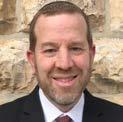
throughout his early writings one may find original and profound insights into these topics. When he prepared to immigrate to Eretz Yisrael from Boisk, he reviewed these laws in depth.
A short time after the Rav’s return to Jerusalem from his protracted stay in London during World War I, he began to teach the Talmud Yerushalmi on the order of Zeraim to a select group of scholars from Yeshivat Etz Chaim. Subsequently, he assembled a group of advanced young scholars which met every evening in his beit midrash to study the mitzvot dependent upon the Land.
Rav Kook was perhaps the most prominent halachic authority who issued practical rulings relating to the mitzvot dependent upon the Land.(‘Celebration of the Soul,’ Jaffe, pp. 106-107)
Torah Everywhere
The eminent leader of German Jewry, Rabbi Samson Rapheal Hirsch, offers a memorable insight regarding the requirement never to remove the poles from the Aron Kodesh (holy ark) which sat in the Beit Hamikdash. He suggested that the poles symbolize the idea that the Torah is portable. No matter where a Jew finds himself in the world the impact and binding nature of the Torah is equal. Rabbi Hirsch contrasts the meaning of the Menorah and Shulchan compared to the Aron: “Israel’s Table (Shulchan) and Israel’s Menorah - its
48 TORAH TIDBITS 1502 / BO 5783
RABBI
Editor, Torah Tidbits
AARON GOLDSCHEIDER
Flying Soon? Travel with Confidence 1UniTravel - Medical Insurance at great prices Choose from multiple options 1unitravel.brokersnexus.com 1UniSim - Sims for USA and Worldwide Starting at $40 sales@1unisim.com Call 077-400-3199 or USA 718-715-0001
material life in its full completeness, and its spiritual and intellectual life in complete clarity and brightness - are bound to the soil of the Holy Land. Israel’s Torah is not. (Commentary by Hirsch, Judaica Press, Levy, 1982)
Rav Kook, as we discern from the above citation from Eretz Chefetz, dramatically differs on his point. The Torah’s laws, the Halacha, shine brightly in the Land in ways that essentially are inaccessible outside of the Land.
Semicha

Rav Kook’s assertion, which is excerpted from Orot, is highlighting the dramatic advantage the decisors of law living in Israel have over those outside the Land. Only in Israel is it possible to attain the full fledged authority of a lawmaker. This is due to the fact that only in the Land of Israel, when semicha is granted, can full fledged lawmaking be actualized.
Rav Kook cites a dramatic story of a great Talmudic sage who gave his life in order to pass on the unique status of semicha to the next generation of rabbis: “What did Rav Yehuda ben Baba do? He went and sat between two great mountains…and ordained five elders…As soon as their enemies discovered them, he [Rav Yehuda ben Baba] urged them: ‘My children flee’...It was said that the enemy did not stir from that spot until they had driven 300 iron spear-heads into his body, making it like a sieve” (Sanhedrin 14a).
Why did he give up his life for this? Seemingly, one is not permissioned to give up one’s life other than the three cardinal sins. Apparently, the granting of semicha in Israel was not an ordinary mitzvah. It








OU ISRAEL CENTER 49
Saturday NightFever! Motzei Shabbat January 28 Between 20:00-22:00 Don’t Miss It! 3 DOROT RISHONIM, JERUSALEM 20%OFF all hats ORDER ONLINE AND GET THE PRODUCTS YOU PREFER DELIVERED STRAIGHT TO YOUR DOOR! ORDER TODAY AND ENJOY SUPERIOR QUALITY, SELECTION AND SERVICE! Use coupon code welcome2ftf and save 5% off your first order! www.FarmToFamily.co.il Netanel 050-344-6261 | Office 058-444-6260 American Service! Want to shop from the convenience of your home? American Products & Specialty Items! Top quality, organic & regular Mehadrin produce
is an institution that is responsible for the very preservation of Torah and its reliable transmission. Indeed, the Greeks understood this and therefore were determined to extinguish authentic semicha from the Jewish community.
Rosh Chodesh’s Reliance the Land
The first mitzvah given to the Jewish people as a whole: “This month shall be the first of the months…”(Shemot 12:2) - is the obligation to establish a Jewish calendar. We are very familiar with this from the first Rashi on the Torah, which states, “The Torah should have begun with “This month shall be…”, which is the first commandment given to Israel…”.
Rashi, in the above citation, explains that the Torah begins with Bereshit to establish the Jewish people’s rights to the Land of Israel. We will now see in our present discussion that the first mitzvah is deeply connected to the Holy Land.
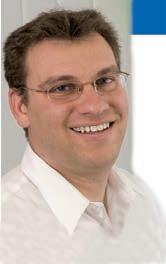
The Rambam writes in Sefer HaMitzvot (Positive Commandment #153): “Know that the calculations we make nowadays, to determine when the new months and holidays fall out, are permissible to be made only in Eretz Yisrael. Only in dire circumstances, and when there are no sages in Eretz Yisrael, is it permissible for a beit
din (rabbinical court) ordained in Eretz Yisrael to intercalate the years and establish months outside the Land…And even this is very difficult…for we may not calculate the months or establish leap years in the exile, unless we fulfill the conditions mentioned above. “For out of Zion the Torah will go forth (Yeshayahu 2:3).”
The halachic imperative of setting the calendar is relegated to the expert sages who live in the Land. The verse quoted by the Rambam is cited in a literal sense. Apparently there are areas of Law that are not “portable.” The very first mitzvah given to the nation is closely tied to the rabbininc leadership administering the law in the Land.
At the same time that semicha ended, the declaration of Rosh Chodesh in Beit Din ceased and a different process, involving a set calendar, took its place. These two halachot of semicha and kiddush hachodesh are interwoven with Eretz Yisrael. These laws are not related to the unique laws of agriculture in the Land, rather, these laws are dependent on Torah study and the authority of Torah scholars that emanate from the Beit Hamikdash. (See Rabbi Zvi Sobolofsky, ‘Eretz Yisrael, Beis Hamikdash and the Center of Torah, TorahWeb.org 2019).
50 TORAH TIDBITS 1502 / BO 5783
Securities offered through Portfolio Resources Group. Inc., member of FINRA, SIPC, MSRB, SIFMA US BROKERAGE SERVICES IN ISRAEL Get the Best of Both Worlds Keep your money in the US and receive local expert investment advice 02-624-0995 054-599-9530 aaron@lighthousecapital.co.il www.aaronkatsman.com CALL
QUESTION OF THE WEEK
I'm a Yeshiva student, 21 years old, and I have a problem that troubles me greatly. Since I learned Maseches Nedarim (a Mishna tractate regarding vows), I've become careful not to vow. The problem is that I'm always stressed about whether I may have vowed without realizing it, and whether I need to nullify the vow. This causes me anxiety and takes away my peace of mind. (I'm constantly asking those around me if they are certain that I said "bli neder" or if I may have, Heav-n forbid, used one of the names connected with vowing). My rosh yeshiva (head of the yeshiva) claims I have a problem called OCD. I'd be glad to hear why this is not a halachic, Torah question. What is OCD and is there a way to treat it? How?



ANSWER


First, it's good that you have written and I'm happy for you. To have an unsolved question which doesn't allow you peace, is tiring and torturous. And you don't need to suffer. The Torah is good and certainly is not meant to cause anyone suffering.
During or in the aftermath of certain life circumstances, a person may develop repetitive thoughts, lacking a logical basis, and find it difficult to stop oneself from thinking them. These thoughts are accompanied by activities or other thoughts meant to alleviate the stress or doubt. The thoughts are termed "obsessive thoughts'' and the accompanying actions are called "compulsions" hence the name of the disorder OCD (obsessive compulsive disorder).
The question is not halachic because in almost all cases one knows sooner or later, that the disorder is what motivated one’s actions and not pure halacha. Furthermore, many young people have gotten surprising allowances from great rabbis for all sorts of different situations, even more complicated than vowing. This is due to the rabbi's understanding that the question can be attributed to the disorder and not purely to the will to clarify halacha. And that is okay.
I don't find a practical need to continue and discuss the halachic view of the matter and believe that when you feel calmer and the difficulty is resolved, the questions will disappear, G-d willing.









And now to treatment! Yes, it can be treated! Certainly! It's a process, and you must take a deep breath to achieve the peace your exhausted soul needs. There are different therapeutic approaches. In "lamerchav" we can try to understand what it is you need. Sometimes, the need is to change the behavior and to ascertain that the compulsive behaviors will not prevail. In other circumstances, one needs to determine the source of the stress causing the problem to be so dominant. A professional will escort you through the process giving space to your feelings, thoughts, memories and hopes. Together, G-d willing, you will overcome this hardship.
One needs a lot of hope and faith, but as you learn in a yeshiva, immersed in these values, I'm sure you will succeed in getting through the process, G-d willing, and place yourself in a more comfortable, functional position.
6 Ha-Tsvi St. Yerushalayim | 02-622-3039 www.kavlnoar.org
Merchav L'Noar
To submit your question email: jerusalemclinic@kavlnoar.org Therapy is fully subsidized by the Kupot Cholim.
Natti Becker Integrative Social Worker
Submitted and paid for by Kav L'Noar
FROM THE VIRTUAL DESK OF THE OU VEBBE REBBE
RAV DANIEL MANN

Dessert After Birkat Hamazon
Question: A friend of mine always eats dessert after Birkat Hamazon in order to avoid questions about whether he should make a beracha on dessert. Is that appropriate?
Answer: The practice of having dessert after Birkat Hamazon has various consequences. It can create a beracha rishona in cases that do not warrant them during the meal. After most desserts, there is a beracha acharona after Birkat Hamazon and not before it (see Shulchan Aruch, Orach Chayim 177:2).
First we will look at whether this system could be halachically justified. A beracha l’vatala is when a beracha is either recited at a time/circumstance when it was not called for or was done in a critically flawed manner. There is a machloket whether this is a Torahlevel (Rambam, Berachot 1:15) or Rabbinic prohibition (Tosafot, Rosh Hashana 33a). A lower level problem is what we call beracha she’eina tzricha (=bshtz) – a beracha that, at the time it was made, was called for, but one should not have put himself in that position.
The main Talmudic source for it is an

opinion (Yoma 70a) that explains that in the kri’at haTorah in the Beit Hamikdash on Yom Kippur, they did not use a second sefer Torah because the switch of sefarim would have required another Birkat HaTorah, when this was not justified. The Orchot Chayim (Berachot 15) is one of the sources that apply it to berachot on food, in an almost identical case to ours – Birkat Hamazon before finishing eating, in order to make a beracha thereafter.
However, as the term she’eina tzricha (unnecessary) implies and the Orchot Chayim (ibid.) states, the problem is only when the additional beracha is created for no good reason. When, in contrast, there is a need for his actions, the beracha is not considered unnecessary. What qualifies as a reason? There is a machloket if one may make more berachot than should have been necessary in order to help get to the quota of 100 berachot each day (see Rambam, Tefilla 7:14-16 with Lechem Mishneh; Orchot Chayim ibid.).
The Shulchan Aruch (OC 174:4) comments that it is a safek whether one who wants to drink wine at a meal right after drinking Havdala wine needs to make another beracha. He rules that he does not make the beracha, out of doubt, but recommends having in mind when making the beracha during Havdala not to exempt the later wine, thereby justifying the second beracha. The Pri Chadash (Yoreh Deah 19:8) says that while
52 TORAH TIDBITS 1502 / BO 5783
תמשנ יוליעל ל"ז ןמצלז לאיזוע םהרבא ןב םירפא לאוי
The Orthodox Union - via its website - fields questions of all types in areas of kashrut, Jewish law and values. Some of them are answered by Eretz Hemdah, the Institute for Advanced Jewish Studies, Jerusalem, headed by Rav Yosef Carmel and Rav Moshe Ehrenreich, founded by HaRav Shaul Yisraeli zt”l, to prepare rabbanim and dayanim to serve the National Religious community in Israel and abroad. Ask the Rabbi is a joint venture of the OU, Yerushalayim Network, Eretz Hemdah... and OU Israel’s Torah Tidbits. one should not break a string of shechitot, which might stop the efficacy of the beracha toward subsequent shechitot, since there would be a safek if a new beracha is required, one should intend that his initial beracha not extend to shechitot occurring after speaking. In other words, while needlessly setting up the need for a beracha is wrong, the desire to not be in a situation of lack of a beracha due to safek justifies it. In fact, the Ohr L’tzion (II, 12:(10)), in the case of a certain dessert in where it is unclear whether it requires a beracha rishona, recommends eating it only after Birkat Hamazon. So there is room to entertain your friend’s system However, we do not recommend your friend’s system, at least not broadly. If the halacha is clear, whether to make or not make a beracha, the suggested system, obviating the need to learn the halacha, is unfortunate. It is much better to learn halachot than to avoid the situations to which they apply. One of the major reasons to learn Torah is to get things exactly correct! This is especially so by berachot, where preciseness is valued (see Berachot 38a). That is why poskim discuss all sorts of dessert foods and scenarios and rarely if ever give his solution. For example, regarding a dessert of cake, we do not make a beracha only due to the possibility that cake counts as bread (Bi’ur Halacha to 168:8), and the poskim by and large do not recommend bentching first to remove doubt.

Furthermore, in cases which do not include doubt, an extra beracha is a bshtz. Only in unusual cases (e.g., one with memory problems), to be discussed with a rav, might using this system broadly be justified.
Having a dispute?
For a Din Torah in English or Hebrew contact ‘Eretz Hemdah - Gazit’ Rabbinical Court: 077215-8-215 • fax: (02) 537-9626 beitdin@eretzhemdah.org

Old Katamon: 4-room apartment in a small and quiet street, 101 sqm, renovated, very bright and airy, master bedroom, Safe room (mamad), sukkah balcony, view, elevator, 3,400,000 NIS
Old Katamon: 4-room apartment, 90 sqm, well split, bright, airy, sukkah balcony facing a magnificent panoramic view, 3 exp Shabbat elevator, parking, 3,290,000 NIS
THE GREEK COLONY: charming 3-room apartment on "Dmei Mafteach" (tenancy protected for life) full of light & good energy, 74m, high ceilings, balcony, 1,400,000 NIS
BAKA: 4 room apartment, 82m, storage, elevator, needs renovation 2,950,000 NIS
Old Katamon: Spacious 3-room apartment in a very quiet street, 75 sqm, sukkah balcony facing a green and pastoral view, 3 exp. Shabbat elevator, private parking, storeroom, 2,690,000 NIS
KATAMON: new project, 2-3 room apartments, starting from 1,750,000NIS


4-5 room apartments starting from 3,200,000 NIS All apartments are fully accessible with parking and storage
OLD KATAMON: 4-room apartment, 94m, balcony, open view, Shabbat elevator, fully accessible, private parking, 3,290,000 NIS
RECHAVIA: 4-room apartment, 92m, Suka balcony, Shabbat elevator, fully accessible, private parking, storage 4,400,000 NIS
BAKA: 5-room garden apartment, 140m, master suite private parking, storage, full of light & airy, nice garden, 5,250,000 NIS
OLD KATAMON: Spacious new 5-room penthouse, 155m, terrace overlooking a great panoramic view, underfloor heating, full of light, Shabat elevator, 2 parking, rental unit, asking price 9,000,000NIS
OU ISRAEL CENTER 53
Meir Golan
077-2050015 052-2678749 golanechasim@gmail.com Meir Golan
PORTION FROM THE PORTION
BY RAKEL BERENBAUM C ontributor, Torah Tidbits

What Do Abuse And The Ten Plagues Have In Common?
The portion begins with God instructing Moshe to go to Pharaoh before the eighth plague of locusts. He tells him “ l have made Pharaoh and his advisors stubborn so that I would be able to demonstrate these miraculous signs among them, and in order that you can relate in the ears of your children and grandchildren the series of deeds which I made on Egypt…”(Shmot 10:1-2).
The verse in Hebrew says “ …et asher hit’alalti bemitzraim”. In reading the verse
I wondered why the Torah chose to use this specific word here. The word hit’alal is used in modern day Hebrew for abuse. Why did the academy for the Hebrew language choose the word hitalal to refer to abuse?
I felt that understanding the meaning of this word better might give both a deeper understanding as to what abuse really is, and more insight into what God wanted to accomplish with the plagues in Egypt. God wasn’t trying to “abuse”the Egyptians, so what is this word coming to teach us?
Rashi on our verse says the word means “to mock”. Balaam used the same word to scold his donkey for mocking him. I found the most interesting explanation for the word given by Rabbi Samson Raphael Hirsch ( 1808-1888). He says that ‘alal ,ללע
ללוע, means a child, since he progresses and develops constantly. And an הלילע, which is also from the same root, is a story consisting of a developing series of actions, not just an isolated deed. So ללעתה is to reveal oneself in a way that progresses. When used in reference to humans it means treating people according to your whim, having no respect for the human worth of the other person. It refers to treating others as material by which one reveals their own power through a progressive series of actions or deeds. When the words are used in reference to God the verse means - “ How I revealed My power in a progressive series of deeds.”
So it could be that the word ללועתה was chosen as the modern word for abuse to refer to the progressive process of grooming that abusers use to win over and trap their victims. They may start by giving attention, compliments and gifts to gain the trust of their victims one step at a time, and end with controlling and abusive behavior.
In relation to the 10 plagues the word “hitallalti” teaches us that the plagues were not haphazard chance changes of nature –God had a very clear calculated educational plan in His choice of type of plagues and
54 TORAH TIDBITS 1502 / BO 5783
their order. As we read at the Seder that Rabbi Yehuda abbreviated the plagues by their initials DZ”CH, AD”SH, B’ACH”V. He divided them into three distinct categories because he noticed an order. The Maharal in his book Gvurot Hashem chapter 57 elaborates on Rabbi Yehuda’s order.
The plagues were very organized. They were divided into three groups of three plagues each. There is a repetitive style in the plagues ; the first two in each group are accompanied by a warning with the third coming without a warning (check for yourself).
The Maharal in Gur Aryeh explains that the plagues in each group have something in common and each group comes to uproot different types of disbelief on the part of Pharaoh and his nation and strengthen beliefs in God.
The first three plagues came to counter Pharaoh’s belief that there is no God and everything happens by chance. “...through this you will know that I am God“(7:17) Finally after the third plague the wizards realized it was God saying “ It is the finger of God “(8:15).
The second set is to show that not only does God exist but there is hashgacha pratit – He is involved in people’s lives in order to give them rewards and punishments. This is seen in the fact that the verses say explicitly that these plagues didn’t strike the Jews “...I will miraculously set apart Goshen, where My people remain...”(8:18; 9:4)
The third group of plagues came to teach that there is no power like God who is all powerful “...so you know that there is none like Me in all the world” (9:14). The tenth plague incorporates all the lessons.
Thanks to Rabbi Hirsch’s clear and detailed explanation of one word in the Torah we learned that abusers act progressively to bait and trap their victims, whereas God acts progressively in Egypt through the 10 plagues to punish Egypt “mida kneged mida” and teach vital lessons of belief in God.
RECIPE
Since we are told that God hardened Pharaoh’s heart, this week’s simple recipe includes artichoke hearts.
ROASTED POTATOES AND ARTICHOKE HEARTS
1/2 bag artichoke hearts 3 potatoes peeled and sliced olive oil salt, pepper, to taste Spread the potatoes and artichoke hearts on a baking pan. Spray with olive oil. Season with salt and pepper. Roast at 200 C for about a half hour. Serve as a side dish or as a snack dipped in hummus or tehina.
On HaPalmach - great 4 room apartment, 92m plus large garden in use, exclusive. Asking 4.95 million NIS
In a good area in the Moshava2 apartments (can be connected), 1st floor, 170m, renovated, Sukkah porch, parking Palmach - 4 rooms, beautiful, 105m, porch, 2 parking spots, machsan, asking 6.1million NIS Smadar 050-3114040 // 02-642-4329 smadi_bida@walla.co.il

OU ISRAEL CENTER 55
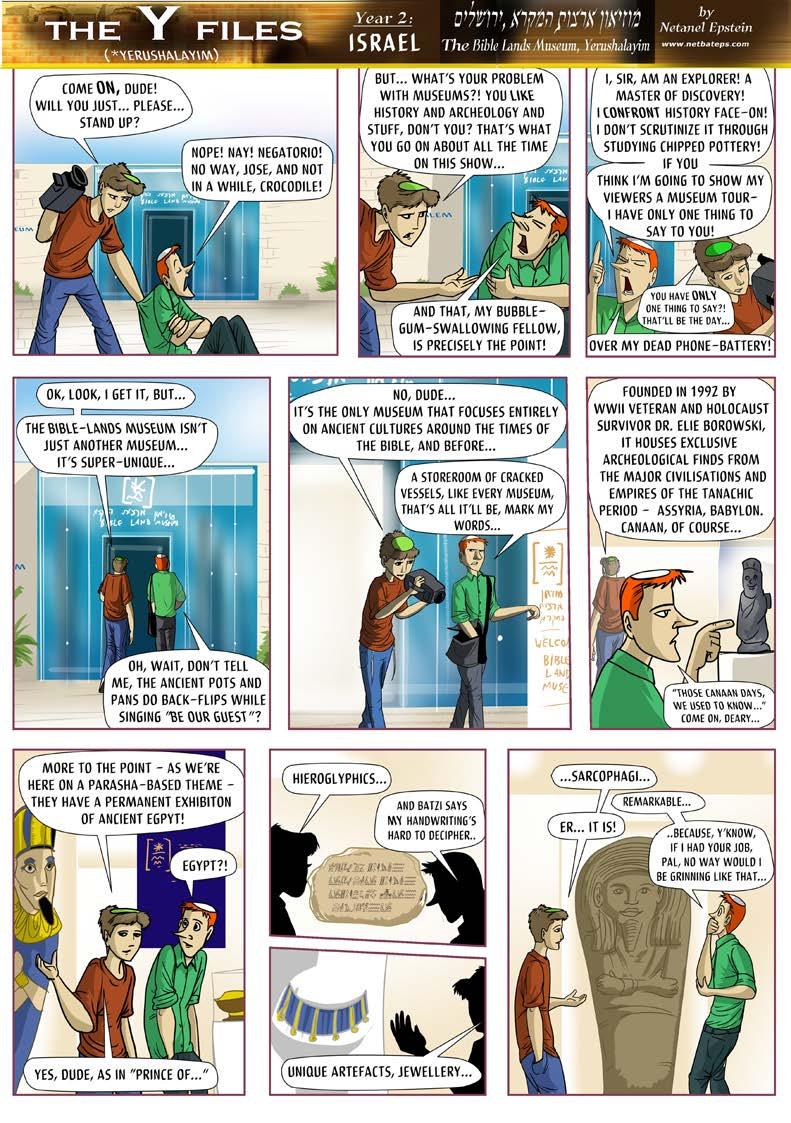
56 TORAH TIDBITS 1502 / BO 5783

OU ISRAEL CENTER 57
Benny Attar Hometown: Teaneck, NJ
Tel Aviv University (Dual Degree with Columbia University)
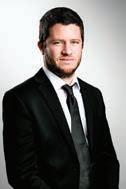


Parashat Bo culminates with arguably one of the peak moments of the Torah and Jewish history: the departure from Egypt after years of slavery, beginning the long trek in the desert where Bnei Israel receive the Torah and ultimately enter Eretz Israel (spoiler alert!). And yet, as Bnei Israel begin their departure from Egypt, where excitement and nerves filled the air, it would be logical that Moshe would prepare a speech on the miraculous moment they were about to witness, mentioning freedom perhaps, or maybe strengthening their faith in Hashem. Rather, seemingly unexpectedly, Hashem instructs Moshe to tell the people the importance of educating their children about how Hashem freed them from Egypt
“דָי קֶזֹחְּב” - with a mighty hand.
Rabbi Sacks Z’L comments on this verse, discussing how “The Mesopotamians built ziggurats. The Egyptians built pyramids. The Greeks built the Parthenon. The Romans built the Coliseum. [but] Jews built schools.” And yet, despite our unimaginable persecution, we’re still here - thriving! The importance of education, instilled in our history since that very day, is one of the key factors of our survival throughout our roller-coaster history.
I’m often reminded of this idea on campus at Tel Aviv University. In a setting that is completely devoted to our educational growth as individuals, as a people, and as a nation, the values of “דֵּמַלְלּו דֹמְלִל” - “to learn and to teach” - are ingrained in our daily walk of life here. Walking through the campus, seeing the Hebrew lettering across buildings, the classrooms fostering the next generation of thinkers in our country, and the beautiful Cymbalista synagogue in the center of campus that I’m fortunate to pray

58 TORAH TIDBITS 1502 / BO 5783
OU-JLIC
Orthodox Union Heshe and Harriet Seif Jewish Learning Initiative on Campus
in daily, the values of knowledge shine through it all.

The JLIC at TAU models this idea even further, where Rav Eitan and Elana host countless meals, classes, and thought-provoking discussions to grow ourselves as individuals and as a collective. When Moshe instructed us while leaving Egypt to instill in our future generations the importance of remembering our past, I believe that a Jewish
learning center on campus is precisely how we can accomplish that. I am eternally grateful for the incredible opportunity to have a center as such on campus - and I am increasingly excited to watch it grow.
The OU’s Jewish Learning Initiative on Campus (JLIC) is creating and nurturing vibrant religious communities in Israel to support English-speaking college students and young professionals. JLIC Israel’s goals include: building a warm and welcoming Jewish community for students and young professionals; providing engaging and dynamic Jewish education; providing a supportive home environment for Olim; providing resources for personal and religious growth, including personal mentoring, Aliyah support, religious guidance and leadership development. Current JLIC programs in Israel include: Reichman University - Herzliya; Bar Ilan University - Givat Shmuel; Tel Aviv University; Tel Aviv for Young Professionals; and Jerusalem. Contact: Rabbi Jonathan Shulman, Director of OU-JLIC in Israel shulmanj@ou.org
ד"סב




OU ISRAEL CENTER 59 Premiummoving.co.il 053-7272-815 PREMIUM MOVING & STORAGE
BY TEENS NCSY ISRAEL


Ian Schwartz Gush Etzion Chapter Director

Have No Fear

The Toldot Yaakov Yosef tells a story from the Baal Shem Tov: There was once a king who invited a special guest to come visit him in his castle. When the guest arrived at the castle he encountered a moat filled with wild animals, hundreds of armed guards, and towering brick walls. The guest was very confused why the king had sent for him when it seemed impossible to reach him. Day after day the special guest received the invitation, until he decided that despite his fears of the obstacles surrounding the castle, he would attempt to approach it. This time when the guest crossed the outermost border to the castle all of the sudden every single one of the daunting barriers was gone, it was all an illusion.
In Parshat Bo, Bnei Yisrael pick up and leave Mitzrayim with all of their possessions. There is no guarantee of food, water, or shelter in the uncompromising
conditions of the desert wilderness. Nevertheless, Am Yisrael trusted that Hashem will take care of them no matter what challenges may lay ahead. The Navi Yirmiyahu reflects on this fondly “יתרכז ה רמא הכ רבדמב ירחא ךתכל ךיתלולכ תבהא ךירוענ דסח ךל העורז אל ץראב” “So said Hashem I remember the devotion of your youth, your love as a bride, to follow me in a desert, a land unsown.” (Yirmiyahu 2:2)
Life and the challenges we face can be extremely scary and intimidating, which sometimes can seem overwhelming. However, just as Am Yisrael had faith and trust in Hashem that he will take care of them in the unknown, so too we can choose to trust in Hashem which will in turn allow our fears to simply disappear.
Ephraim Gonsher 10th Grade, Efrat Time is on your Side
Parshat Bo discusses the first Mitzvah given from Hashem to the Jewish People, the Mitzvah to sanctify the new moon. During the times of the Beit Mikdash, sanctifying the moon was a complex process that involved witnesses, testimony, and

60 TORAH TIDBITS 1502 / BO 5783
TORAH 4 TEENS
MASSAGE THERAPIST & FITNESS TRAINER 052.673.3704 I www.andyhealth.com | jerusalemmyhome@hotmail.com TUVIA ANDY HAAS BALANCE and FALL-PREVENTION SPECIALIST for OLDER ADULTS Maintain Healthy Bones and Muscles Decrease Stiffness and Joint Pain Increase Strength! Stay Independent!
the Jewish Court - all things we can’t do at this point!


So why is this Mitzvah being introduced now of all places? We could have been told not to steal, not to covet, not to kill - all things we learn not to do from the Mitzrim and could do practically. But, instead we are given the Mitzvah of the Jewish calendar? We didn’t have the means to do the practice since we had just left Mitzrayim!






The answer is that in Egypt, we had to do what the Egyptians wanted and when they wanted it. Time was not our own; it was theirs. But when we were given the Mitzvah of the months and moon, we became the ones who initiated the month; we became masters of our own time! For example, if the new moon were on Sunday, but no one testified about it until Monday, that is when the month would start. Even in the case of Rosh HaShana, Hashem would act according to the Jewish court and even push off his judgment for a full day! With this Mitzvah, Hashem is empowering us and showing how we are in charge of not only our time, but of His as well. Shabbat Shalom.

OU ISRAEL CENTER 61 Hillel -052-5955-492 M Men achem -052-5955-073 Real Estate Brokerage Property Management (Maintenance & LT rental) Project Management (Renovations & Construction) ALL YOUR UNDER ONE ROOF! ErusalEm HomEs The Mendlowitz Family business with over 40 yearsof experience in the US and Israel!
Shifra Lopian 0526735300 Special properties for sale! >> Off market! Rechavia penthouse! Luxury finishes, big sukka balcony, elevator parking and storage, 12.5m NIS >> Nachlat Achim amazing investment! Selection of new apartments. 4-room apartment starting at 3.3m NIS >> Talbia new exclusive! New building 2 apartments left! Has parking, balcony and very high finishes. Price 60000 nis/sqm >> Rechavia/ Shaarei Chessed! Duplex roof top apartment! Bright 4 room duplex with massive roof top and parking! 4.8 m nis >> Unique renovated 4 room apartment on the first floor, balconies (one sukka) and storage! 6.5 m. Nis flex ...המלש האופר • Miriam Tovah Chaya bat Chanah Elisheva Rivka •Yosef Ezriel ben Chaya Michal הלחמ ןב ןתנוהי • רתסא ןב המלש • לזייר הניס ןב ץרה ילתפנ • הכרב הנח ןב השנמ םהרבא • • Esther Fruma bat Baila • Yisrael Leib ben Chana המלש האופר הקבר תב אגייפ הניר
62 TORAH TIDBITS 1502 / BO 5783 FACILITATE • CELEBRATE • ADVOCATE • EDUCATE ISRAEL JOB BOARD ISRAEL JOB BOARD ISRAEL JOB BOARD POWERED BY: NEFESH B'NEFESH ISRAEL JOB BOARD POWERED BY: NEFESH B'NEFESH ISRAEL JOB BOARD ISRAEL JOB BOARD ISRAEL JOB BOARD ISRAEL JOB BOARD POWERED BY: NEFESH B'NEFESH ISRAEL JOB BOARD POWERED BY: NEFESH B'NEFESH ISRAEL JOB BOARD ISRAEL JOB BOARD ISRAEL JOB BOARD ISRAEL JOB BOARD POWERED BY: NEFESH B'NEFESH ISRAEL JOB BOARD POWERED BY: NEFESH B'NEFESH ISRAEL JOB BOARD ISRAEL JOB BOARD ISRAEL JOB BOARD ISRAEL JOB BOARD POWERED BY: NEFESH B'NEFESH ISRAEL JOB BOARD POWERED BY: NEFESH B'NEFESH ISRAEL JOB BOARD Visit The Nefesh B'Nefesh Israel Calendar to explore English-language events taking place all over the country! www.theisraelcalendar.org For more information: www.nbn.org.il



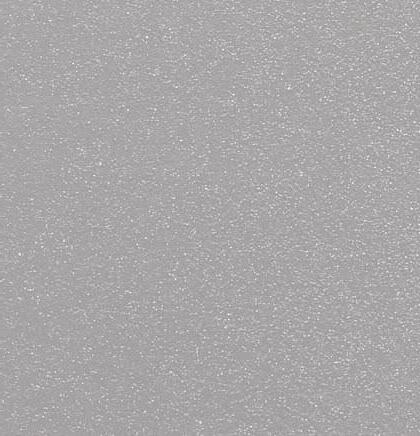






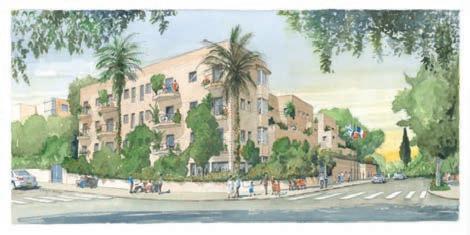



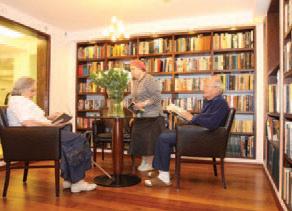

OU ISRAEL CENTER 63 27 KOREH-HADOROT ST., JERUSALEM NEVE.SHALEM @GMAIL.COM | WWW.NEVE-SHALEM.CO.IL BOUTIQUE RESIDENCE FOR SENIORS IN THE LUXURIOUS NEIGHBORHOOD OF ARNONA, JERUSALEM NEVE SHALEM IS AN ASSISTED LIVING FACILITY FOR RETIREES AND SENIORS WITH 60% ENGLISH SPEAKERS! Full calendar of activities and entertainment in English and Hebrew! Quality apartments built to high standards with balconies & gardens Professional medical services A dedicated staff providing for all the needs of our senior citizens 24/7 - Just like family! *3204 SINCE 1995 IMMEDIATE OCCUPANCY! 3 ROOM APARTMENT WITH AMAZING GARDEN!
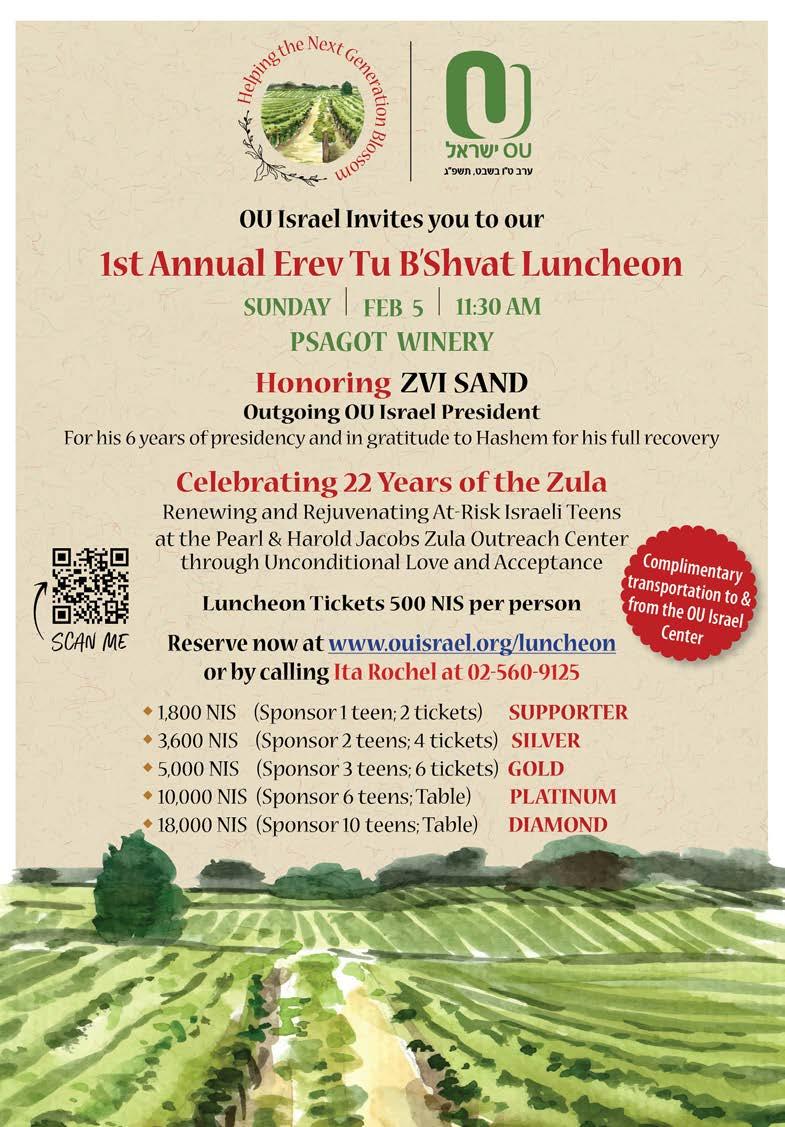



























 OU Executive Vice President
OU Executive Vice President






 Director
Director
































































































































































































